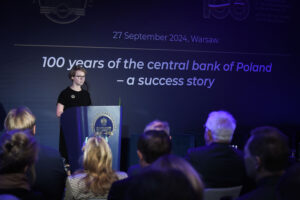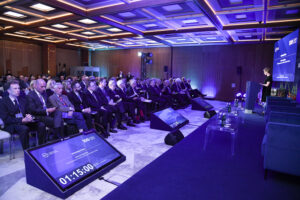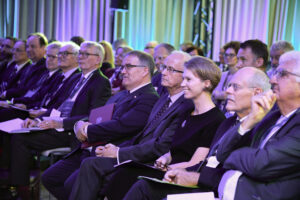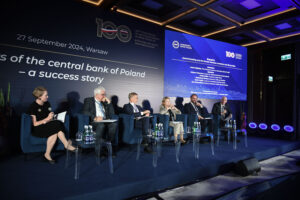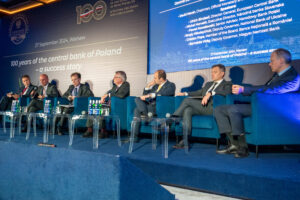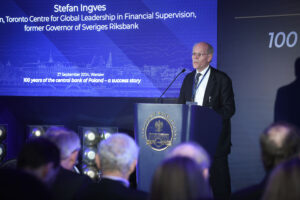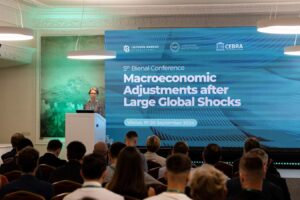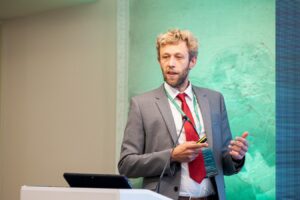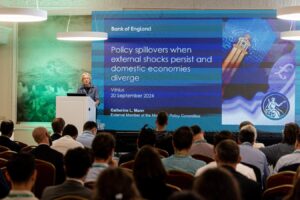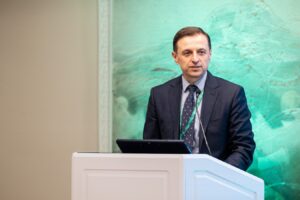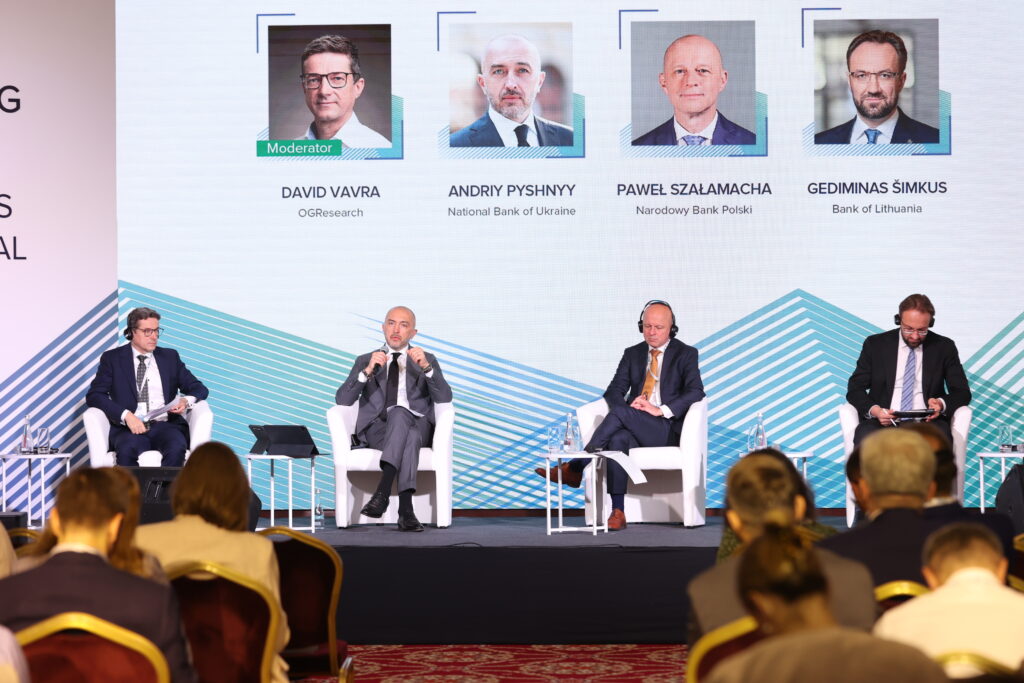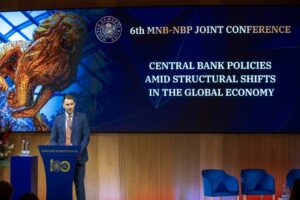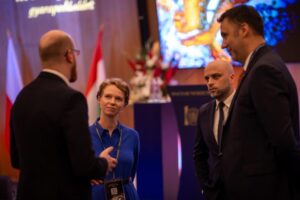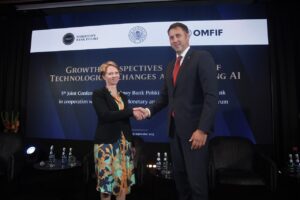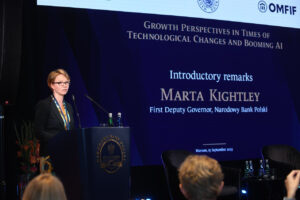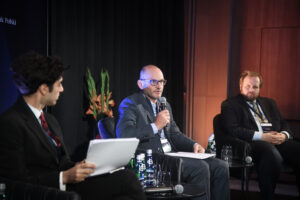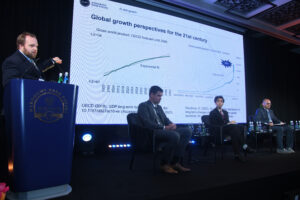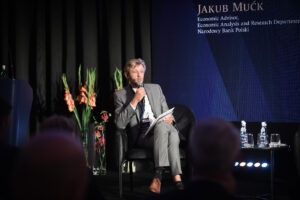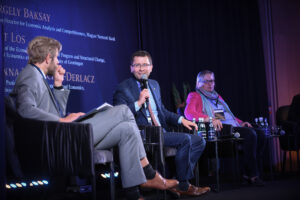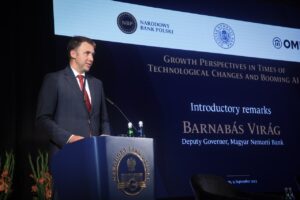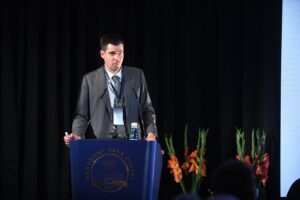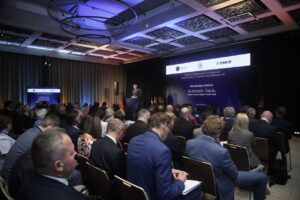NBP Conferences
By organising conferences and seminars Narodowy Bank Polski aims to enhance its role in the international economic debate, to expand cooperation with other central banks [...]By organising conferences and seminars Narodowy Bank Polski aims to enhance its role in the international economic debate, to expand cooperation with other central banks […]
By organising conferences and seminars Narodowy Bank Polski aims to enhance its role in the international economic debate, to expand cooperation with other central banks, as well as to intensify contacts with important academic centres and international institutions. In its capacity, NBP actively stimulates public debate via a variety of measures and communication channels, i.a. by hosting seminars and conferences. These are designed to enhance economic knowledge amongst the general public and financial market agents as well as to disseminate and consolidate understanding of the role and mission of the central bank in economic life, including monetary policy, financial stability and a number of other economic issues within central bank competencies.
At NBP, comprehensive organisation of international conferences is handled by the International Conferences Division within the International Department.
Contact: conference@nbp.pl
2024
Warsaw, 27 September 2024, "100 years of the central bank of Poland – a success story"
The international conference of Narodowy Bank Polski, dedicated to the centenary of Polish central banking, was held on 27 September 2024 in Warsaw under the title 100 years of the central bank of Poland – a success story.
The theme of the conference was the centenary of Narodowy Bank Polski (NBP), which took place in 2024. In 1924, shortly after Poland regained independence in 1918, Bank Polski SA, the predecessor of Narodowy Bank Polski, was established as part of reforms carried out by Prime Minister Władysław Grabski. That same year, the Polish currency – the zloty – was introduced into circulation. The conference debate, inspired by this unique anniversary, aimed to provide a comprehensive view of the past, present, and future of central banking in Poland and the region.
Highlights of the conference included keynote lectures by Stefan Ingves, Governor of the central bank of Sweden (Sveriges Riksbank) from 2006 to 2022, and Charles Goodhart, a long-term advisor to the Bank of England on monetary policy and an emeritus professor at the London School of Economics. The discussion panels featured high-ranking representatives from central banks across many countries in the region:
- Austria: Robert Holzmann, Governor of the Oesterreichische Nationalbank
- Croatia: Boris Vujčić, Governor of Hrvatska narodna banka
- Czech Republic: Eva Zamrazilová, Deputy Governor of Česká národní banka
- Estonia: Madis Müller, Governor of Eesti Pank
- Lithuania: Gediminas Šimkus, Governor of Lietuvos bankas
- Romania: Cristian Popa, Member of the Management Board of Banca Naţională a României
- Slovakia: Michal Horváth, Executive Director of Národná banka Slovenska
- Ukraine: Sergiy Nikolaychuk, Deputy Governor of the National Bank of Ukraine
- Hungary: Barnabás Virág, Deputy Governor of Magyar Nemzeti Bank
- ECB: Ulrich Bindseil, Director General of the ECB
as well as representatives of international financial institutions and distinguished academic professors:
- Harold James, Professor of History and European Studies, Princeton University
- David Marsh, Chairman of the Official Monetary and Financial Institutions Forum (OMFIF)
- Stephen Quinn, Professor of Economics, Texas Christian University
- William Roberds, Emeritus Research Economist and Senior Advisor, Federal Reserve Bank of Atlanta
- Stefano Ugolini, Associate Professor of Economics, University of Toulouse
The three panels discussed the evolution of central banking, contemporary monetary policy challenges, and its future worldwide.
Historically, central banks primarily financed state debt, especially war expenses, evolving within various monetary systems and exchange rate regimes. After the collapse of the Bretton Woods system, central banks shifted from money supply control to an inflation-targeting strategy, with central bank independence as a key factor.
In the context of the centenary celebrations of the establishment of Bank Polski SA and the introduction of the zloty into circulation, it was emphasized that the history of central banking in Poland spans much more than the last 100 years. The first Polish central bank to issue currency and credit was the Bank of Poland (Bank Polski), established in 1828 in the Congress Kingdom of Poland. It was liquidated in 1886, interrupting the history of Polish central banking for many years. As the panel participants pointed out, despite this lack of institutional continuity, central banking in Poland was effectively resumed in 1924, a fact also highlighted in the first speech by Stanisław Karpiński, the President of Bank Polski SA. Key milestones in the history of Narodowy Bank Polski – namely the years 1924, 1945, and 1989 – were also discussed, marking the rebirth of the central bank under varying circumstances: hyperinflation, the end of World War II, and the fall of communism.
The panel on modern central banking focused on lessons from the post-pandemic inflation surge, noting that central banks’ response led to disinflation and alignment with targets, while GDP growth and labour markets remained stable, achieving a “soft landing.” However, constrained fiscal space and challenges like demographics and the energy transition limit fiscal policy’s effectiveness.
The final panel explored the future of central banking, addressing fiscal dominance, AI developments, and central bank digital currencies (CBDCs). The issuance of CBDCs aims to maintain the relevance of central bank money and address concerns about private sector payment system dominance. The panel also stressed that additional responsibilities, like climate change, should remain with governments to preserve central banks’ focus on price stability and independence.
The conference was attended by both foreign and Polish economists, representatives of central banks and international financial institutions, as well as distinguished scholars and practitioners of economic policy. During the conference sessions, the guests emphasized NBP’s achievements, particularly during the pandemic and after the outbreak of the war in Ukraine, congratulated the bank on its centenary, and wished it continued success in the years to come.
Vilnius, 19-20 September 2024, 5th edition of the joint conference of NBP and LB
Macroeconomic adjustments after large global shocks
The fifth edition of the joint conference of Narodowy Bank Polski (NBP) and the Bank of Lithuania (Lietuvos Bankas – LB) titled Macroeconomic adjustments after large global shocks was held on 19-20 September 2024 in Vilnius. Held every two years, the event brought together experts from central banks, financial institutions and academia to discuss the impact of global shocks on the economy and the macroeconomic adjustments they bring. As usual, the conference was held under the patronage of CEBRA (Central Bank Research Association).
At the 5th edition of the joint NBP-LB conference, NBP was represented by a delegation led by Professor Marta Kightley, First Deputy Governor of NBP. As the conference was co-hosted by the central banks of Poland and Lithuania, Professor Kightley delivered an opening address alongside Julita Varanauskienė, Deputy Governor of the Bank of Lithuania. Furthermore, NBP representatives actively participated in the conference panels – Professor Krzysztof Makarski introduced the keynote lecture by Professor Jaume Ventura titled “Fixed costs, product heterogeneity and the force of competition,” while Professor Michał Brzoza-Brzezina served as a discussant in the session on economic policies in an uncertain environment. Dr Jakub Mućk, in turn, contributed as a discussant in the session focused on global shocks.
On the first day of the conference, thematic sessions focused on economic networks and their impacts, the effectiveness of monetary policy, and the role of economic sanctions. The second day addressed the challenges faced by economic policy amidst uncertainty and examined the effects of global shocks on the economy.
The conference program featured discussions on the impact of major events, such as the COVID-19 pandemic and Russia’s full-scale invasion of Ukraine, which have brought about significant challenges, including supply chain disruptions, energy resource constraints, and a rapid rise in inflation. Speakers explored how these global shocks have led to substantial shifts in international trade and have required unprecedented responses from both monetary and fiscal policies. The macroeconomic consequences of these shocks, their effects on households and businesses, and the mechanisms of their transmission were thoroughly examined throughout the sessions.
The speakers included eminent representatives from the academic world and practitioners from international financial institutions. The event’s highlights were keynote speeches by Professor Jaume Ventura (CREI, UPF, BSE), Professor Oleg Itskhoki (Harvard University), and Catherine L. Mann (Bank of England), who presented the most critical aspects of global macroeconomic changes and their impact on monetary policy.
The conference provided an excellent platform for exchanging ideas and experiences in macroeconomics, monetary policy, and international economic relations, while also reinforcing the strong bilateral ties between the central banks of Poland and Lithuania.
Warsaw 12-13 September 2024, Shaping a New Reality of Cash Conference 2024
Shaping a New Reality of Cash Conference 2024
“New normal” – old challenges?
Narodowy Bank Polski conference
Warsaw, 12-13 September 2024
Call for Papers
Narodowy Bank Polski (NBP) is organising its forthcoming scientific conference focused on cash and cash market phenomena. The key objective of the conference is to encourage the representatives of central banks and other public institutions, as well as researchers, to discuss the most up-to-date issues related to cash and its changing economic and social role. The aim is to share knowledge focused on cash-related phenomena observed in various countries. We believe that such an international discussion will allow a better understanding of the challenges that cash may face in the future.
The topics to be covered during the conference include, but are not limited to:
- The role of cash in the economy (microeconomic and macroeconomic perspective);
- Cash in an era of digitalization;
- The role of cash in society, its evolution and challenges;
- Demand for cash and its forecasting;
- Cash management;
- Optimal payment mix and changes in payment habits;
- Transaction and non-transaction motives for holding cash;
- Access to and availability of cash;
- Cash acceptance;
- Costs of cash;
- Cash withdrawals and cash deposits;
- Cash quality and recirculation.
Papers related to other aspects of cash circulation will also be considered.
Submission of abstracts
We invite experts from central banks, other institutions and academia to submit their papers. We will consider all papers and abstracts focused on cash-related issues. Each submitted abstract will be reviewed by the conference committee.
Abstracts should be 200-300 words long. Each submitted abstract should also include:
- Titles and full names of all authors;
- Title of the paper;
- Full affiliations of all authors;
- Contact person, with full contact details (email, postal address);
- Key words and JEL codes.
To have a paper considered for inclusion in the conference, please submit either an abstract or a full paper to CashConference@nbp.pl.
Important dates:
07.04.2024 – abstract submission deadline
28.04.2024 – author notification
05.06.2024 – registration open
30.06.2024 – registration deadline
15.07.2024 – registration confirmation
12-13 September 2024 – conference
General schedule:
11.09.2024 (in the evening): welcome reception;
12.09.2024: conference and social programme, including an official dinner;
13.09.2024: conference; in the afternoon/evening – participants’ departure.
A detailed schedule will be announced after submission of papers and selection of speakers.
Should you have any questions, please contact the Organising Committee:
Cash and Issue Department
Narodowy Bank Polski
CashConference@nbp.pl
phone: +48 22 185 45 79
Kyiv, 20-21 June 2024, 8th Joint NBU-NBP 2024 Annual Research Conference
8th Joint NBU-NBP 2024 Annual Research Conference
On 20–21 June 2024, the 8th Annual Research Conference organized jointly by Narodowy Bank Polski (NBP) and the National Bank of Ukraine (NBU) with the support of the International Monetary Fund (IMF) and the USAID Investment for Business Resilience Activity, titled Navigating the Changing Landscape: Central Banks in a New Normal, took place in Kyiv.
The first day featured research sessions held online. The second day allowed participants to join panel discussions in-person or online.
At the joint NBP-NBU conference in Kyiv, NBP was represented by Paweł Szałamacha, Member of the Management Board.
The purpose of the conference was to create a forum for the discussion and exchange of ideas and experiences among the representatives of central banks, financial institutions, and leading universities from Ukraine, Poland, the US, the UK, Ireland, Belgium, Switzerland, Moldova, Lithuania, Canada, and other countries. The conference was attended in person by over 137 high-level representatives of central banks and international financial institutions as well as renowned scholars and economic policy makers. Additionally, 317 participants from 29 countries joined the conference online.
The conference addressed strategies that central banks could apply to effectively manage the economic consequences of the war in Ukraine and related current challenges.
During the first conference day, devoted to research, representatives of the IMF, the European Central Bank (ECB), the central banks of the US, Canada, Poland, Moldova, and Ukraine, the Bank for International Settlements (BIS), the Center for Research on International Economics (CRIE), and Western universities presented their research on the following topics: the effects of large and asymmetric shocks on economic development, the relationship between monetary policy and financial stability, constraints of the monetary policy transmission mechanism, the role of fiscal policy in safeguarding macrofinancial stability, and innovative tools and new areas of central banking
The second conference day, devoted to the practical aspects of macroeconomic policy, was inaugurated by Paweł Szałamacha, Member of the Management Board of NBP, who delivered the introductory remarks alongside Andriy Pyshnyy, Governor of NBU, Uma Ramakrishnan, Deputy Director in the European Department at the IMF, and Jeffrey Lehrer, Acting Deputy Mission Director at USAID Ukraine.
There were three panel discussions: Panel I: Challenges for a Central Bank in New Normal, where Paweł Szałamacha, Andriy Pyshnyy and Gediminas Šimkus, Governor of the Bank of Lithuania were speakers, Panel II: Towards Recovery: Sanctions, Reparations, and Use of Seized Assets, and Panel III: Post-War Recovery through European Integration.
Among the speakers on the second conference day there were also representatives of the IMF, the U.S. Embassy and the EU Delegation to Ukraine, the central banks of Lithuania, Poland, and Ukraine, the Ukrainian government, the Peterson Institute for International Economics, the Bruegel Information and Analytical Center, OGResearch consulting company, and the Kyiv School of Economics. The discussion was enriched by Ukrainian and foreign experts, scholars, and professors.
Notable moments at the conference included two keynote lectures delivered by Frank Smets, Adviser to the Counsel to the Executive Board at the ECB, and Gita Gopinath, First Deputy Managing Director of the IMF.
The conference programme and its streaming are available on the website: Annual Research Conference ARC 2024.
Budapest, 10 June 2024, 6th Joint Conference of NBP and MNB
Central bank policies amid structural shifts in the global economy
On 10 June 2024, the 6th Joint Conference of Narodowy Bank Polski (NBP) and Magyar Nemzeti Bank (MNB), was held in Budapest, Hungary. The conference, titled Central bank policies amid structural shifts in the global economy, was yet another edition of a conference series which NBP and MNB launched in 2018, hosting the event alternately in Poland or in Hungary.
The purpose of this year’s conference, framed in the context of the structural shifts in the world economy and their implications for the economies and central banks of the countries of the region, was to create a forum for the exchange of ideas among central bankers. The conference was attended by high-level representatives of central banks and international financial institutions, economic policy makers as well as representatives of investment entities.
The conference was opened by Barnabás Virág, Deputy Governor of MNB, who delivered the introductory remarks along with Marta Kightley, First Deputy Governor of NBP.
The highlight of the conference was the keynote lecture by Álvaro Santos Pereira, chief economist of the Organisation for Economic Co-operation and Development (OECD) about the challenges of the last decade, discussing the desirable directions of regulatory measures in the field of economic policy which could positively affect the economic growth, employment, and social development.
The remainder of the conference was organized as three panel sessions.
During the first session, Piotr Żuk (NBP), moderated the debate of four speakers, András Balatoni (MNB), Geoff Gottlieb (IMF), Richard Grieveson (wiiw), and Julia Wörz (central bank of Austria). These notable central bankers and economists discussed a range of topics relating to the session’s title “Integration and convergence in a restructuring global economy.” They emphasised that despite negative influence of the COVID-19 pandemic and the Russian military aggression against Ukraine on the global value chains, new trends have appeared, such as near-shoring and friend-shoring, offering new opportunities for the CEE region, if it increases its competitiveness by promoting technological development, digitalization, energy sector transition, and addressing the demographic changes.
The second session, titled “The evolving role of central banks in the decade of challenges,” was moderated by Ádám Banai (MNB). The debate of four speakers representing central banks of the region, including Joanna Niedźwiedzińska (NBP), Tomáš Straňák (central bank of Slovakia), Iikka Korhonen (central bank of Finland) and Csaba Bálint (central bank of Romania), touched on such aspects as expectations of the neutral interest rate development in the long run, importance of institutional settings for the effective monetary policymaking, and the role of economic research in developing a deeper understanding of challenges faced by central banks.
During the third session „Views from investor on CEE”, devoted to the countries of Central Europe from the investors’ perspective, moderated by Ugras Ulku (Institute of International Finance – IIF), representatives of investment entities: Mark Patrick (TIAA), Stephen Elgie (Argo Capital Management), Philipp Mayer (Erste Group Bank AG), and Holger Sandte (Danish Export and Investment Fund) discussed the attractiveness and challenges of our region in terms of investment.
The conference debate confirmed that the structural changes taking place in the economy at the global level have an impact on the directions of development of the Central European region and on the contemporary understanding of the role of central banks.
2023
Warsaw, 29-30 November 2023, Recent trends in the real estate market and its analysis, 2023 edition
Narodowy Bank Polski (NBP) and SGH Warsaw School of Economics recently organized a conference, along with an NBP international workshop, to delve into current issues in the field of real estate analysis from the central bank’s perspective. The discussions encompassed the development of residential real estate prices, commercial real estate prices, and real estate financing. The event targeted researchers from academia, private firms, and central banks.
The workshop extensively covered a range of topics, including but not limited to:
- The impact of monetary, fiscal, and macroprudential policies on real estate finance and the development of the market;
- Monitoring and modelling of real estate cycles (demand and supply), with a focus on the shocks that the COVID-19 pandemic and the Russian War in Ukraine generated;
- The development of property rents and prices, their modelling and analysis;
- A new approach to real estate analysis (i.e., urban economics and regional studies, spatial analysis, sociological and behavioural aspects in the real estate decision-making process, filtration, the ripple effect, gentrification, etc.);
- The modelling and measurement of mutual relationships between housing, commercial real estate, and the economy.
Venue:
29-30 November 2023
SGH Warsaw School of Economics (Building C)
Al. Niepodległości 128, Warszawa
In case of any questions please contact:
International Department
International Conferences Division
Narodowy Bank Polski
conference@nbp.pl
Financial Stability Department
Real Estate Market Analyses Division
Narodowy Bank Polski
realestateworkshop@nbp.pl
Presentations
Eva Arnold; Banks through the Lens of the Media
Adam Czerniak; Impact of Ukrainian refugees migration on rental prices across Europe
Marco Lo Duca; Mortgage supply and house prices: a BVAR analysis for the Euro area
Artur Gajda; Preferences of tenants in the Polish housing market
Barbara Jarmulska; Asset prices, collateral and bank lending: the case of Covid-19 and real estate
Jan Klacso; The National Bank of Slovakia Residential Real Estate Dashboard
George Matysiak; New approaches towards classifying unlisted commercial real estate funds (UCREF)
Giorgia de Nora; Institutional investors and house prices
Jean-Pierre Schaefer; Producing social housing despite the current economic and political turbulence
Karin Wagner; Housing markets from the perspective of households: Selective survey data evidence
Borek Vasicek; Housing market surveillance in the European Commission
Stefen Zeugner; MAPADOMO A regional housing market database for the EU Stefen Zeugner
Warsaw, 20 October 2023, 11th NBP Annual Flagship Conference on the Future of the European Economy (CoFEE)
On 20 October 2023, the 11th NBP Annual Flagship Conference on the Future of the European Economy (CoFEE) titled Investment for Growth was held in Warsaw, Poland.
The conference was attended by almost 160 participants, including economists, representatives of central banks and international financial institutions as well as renowned scholars and economic policy makers. This year’s conference, titled Investment for Growth, was an attempt to answer the question why the level of investment is unsatisfactory in many European countries, especially in Central Europe, and what economic policy tools should be employed to boost it.
The conference was opened by Marta Kightley, First Deputy Governor of NBP, who delivered the introductory remarks, highlighting that on the one hand, investment is a driver of economic growth and convergence, and on the other hand, a growing economy generally provides a favourable environment for further investment. Deputy Governor Kightley emphasised that – in the context of the war in Ukraine – the most urgent investment needs include military defence spending, reorganizing the energy sector, and social protection for refugees from Ukraine, whose closest neighbours, geographically closer than the “old EU”, are the Central European countries.
The highlight of the conference was the keynote lecture by Odile Renaud-Basso, President of the European Bank for Reconstruction and Development. President Renaud-Basso stressed that increasing the ratios of investment-to-GDP, especially in Central Europe, is key to economic growth. The EBRD President also enumerated the most urgent investment challenges that still need to be addressed in Poland and the CEE region.
The conference consisted of three discussion panels. The first session was devoted to a stocktaking of factors shaping growth in Europe, the second one focused on European and national policies to stimulate investment, and the last session, called “Crystal Ball”, was an attempt to answer the question: what is special about Central Europe and why is the investment-to-GDP ratio surprisingly low in many countries of this region, despite their convergence to the EU average GDP per capita?
This year the conference sessions were moderated by Gediminas Šimkus – Chairman of the Board of Lietuvos bankas, Jan Frait – Deputy Governor of Česká národní banka, and David Marsh – Chairman and co-founder of the London think-tank OMFIF (Official Monetary and Financial Institutions Forum).
Prezentacje
Jan Frait
Session I: Factors shaping growth in Europe – a stocktaking
Patrick Bisciari
Economic growth and productivity gains in the EU
Magdolna Sass
Session I. Factors shaping growth in Europe – a stocktaking
Marzenna Weresa
Factors shaping growth in Europe: Focus on Innovation
Iain Begg
Stimulating growth. Who? How?”
Marco Buti
European and national policies to stimulate growth/investment
Birgit Niessner
Session II. European and national policies to stimulate growth/investment
Christos Pitelis
Fabrizio Coricelli
Investments, convergence, and capital inflows in Central Eastern Europe
Mario Holzner
What is special about investment in Central Europe?
Jacek Kotłowski
What is special about Central Europe?
Cristina Savescu
Warsaw, 15 September 2023, 5th Joint Conference of NBP and MNB in cooperation with OMFIF
5th Joint Conference of NBP and MNB in cooperation with OMFIF
titled Growth Perspectives in Times of Technological Changes and Booming AI
On 15 September 2023, the 5th Joint Conference of Narodowy Bank Polski (NBP) and Magyar Nemzeti Bank (MNB), organized in cooperation with the Official Monetary and Financial Institutions Forum (OMFIF was held in Warsaw, Poland. The conference, titled Growth Perspectives in Times of Technological Changes and Booming AI, was yet another edition of a conference series which the central banks of Poland and Hungary launched in 2018, hosting the event alternately in Warsaw or in Budapest.
The purpose of this year’s conference, framed in the context of the omnipresence of artificial intelligence and its economic implications, was to create a forum for discussion and exchange of ideas among central bankers and academic economists. The main theme of the debate was the impacts of digital innovation and AI on global growth. Powerful AI algorithms hold the promise to revolutionize work, automate a wide range of tasks, and boost productivity, counteracting the expected slowdown due to declining population growth rates. But will they really do so, and if so, at what cost?
The conference was attended by over 100 high-level representatives of central banks and international financial institutions as well as renowned scholars and economic policy makers.
The conference was opened by Marta Kightley, First Deputy Governor of NBP, who delivered the introductory remarks along with Barnabás Virág, Deputy Governor of MNB.
The highlight of the conference was the keynote lecture by Anton Korinek, Professor at the Department of Economics and Darden School of Business at the University of Virginia, an internationally esteemed expert in the economics of artificial intelligence. Professor Korinek expressed the views that there is no obvious ceiling to the capabilities of AI, that they are already useful for cognitive workers, and that future advances in AI are highly likely to boost productivity and growth.
The remainder of the conference was organized as two panel sessions, each followed by a Q&A. During the first session, Ádám Banai (MNB), moderated the debate of three speakers, Jakub Growiec (NBP), Julian Jacobs (OMFIF), and Francesco Venturini (University of Perugia). These notable central bankers and economic scholars discussed a range of topics relating to the session’s title “Global Growth Perspectives in a World of Digital Innovation and AI”, including diverse forecasts of global growth perspectives for the 21st century (some including the possible advent of artificial general intelligence, AGI), spatial inequality in AI industry growth, and the impact of the development of AI on productivity and its distributive effects in Europe. The second session, titled “Perspectives for the CEE Region”, was moderated by Jakub Mućk (NBP). The debate of three speakers, including Gergely Baksay (MNB), Bart Los (University of Groningen), and Joanna Wolszczak-Derlacz (Gdańsk University of Technology), touched on such aspects as challenges to economic growth in the region, including unfavourable demographic trends (low fertility, aging populations), functional specialization in global value chains as well as an empirical examination of global value chains involvement and technology adoption as determinants of not just wages, but also working conditions.
The conference discussions confirmed that AI has a tremendous impact on economic thinking today.
Presentations:
Anton Korinek
Transformative Advances in AI and Implications for Economic Policy
Ádám Banai
Global growth perspectives in a world of digital innovation and AI
Jakub Growiec
Global Growth Perspectives in a World of Digital Innovation and AI
Julian Jacobs
Spatial Inequality in AI Industry Growth
Francesco Venturini
Development of AI: Productivity and distributive effects in Europe
Gergely Baksay
Challenges of economic growth in the decade of tensions
Bart Los
Functional Specialization in Global Value Chains
Joanna Wolszczak-Derlacz
The joint impact of GVC and digital progress on job quality in Europe
Cracow, Economic Policies during Wartime and Post-War Recovery
NBU-NBP 2023 Annual Research Conference
Economic Policies during Wartime and Post-War Recovery
Call for papers
Paper Submission Deadline: Wednesday, 15 March 2023
The full-scale russian invasion of Ukraine on 24 February 2022 has resulted in huge human losses and massive economic damage. Through its targeted destruction of public infrastructure and private capital, russia has damaged the foundation of Ukraine’s economy still reeling after the COVID19 pandemic. The ensuing internal displacement and emigration further reinforce the loss of productive capacity. Swift action by key policy institutions and international support have limited and partially reversed the negative effects of war. Much work remains to be done to restore the long-term potential of the Ukrainian economy while rebuilding damaged cities and communities.
The 7th Annual Research Conference jointly organized by the National Bank of Ukraine (NBU) and Narodowy Bank Polski (NBP) will focus on the design and implementation of policies to support the economy during the war and to facilitate recovery after the war. Considering a broad range of topics, from monetary policy and financial stability tradeoffs in a period of long and persistent shocks to optimal communication and FX market interventions to interactions of fiscal and monetary authorities, the event will explore various policy designs and their associated long-term costs and benefits
The two-day event, taking place in Kraków (Poland), will feature keynotes, policy panels and presentations of research papers in a blended online/onsite format.
Confirmed keynote speakers are Boris Vujčić, Governor of the Croatian National Bank, and Barry Eichengreen, the George C. Pardee and Helen N. Pardee Professor of Economics and Professor of Political Science at the University of California, Berkeley.
The organizing committee invites submissions in the following areas (non-exhaustive):
- Post-war development: optimal governance and allocation
- The optimal fiscal-monetary mix in response to energy and food prices shocks in postpandemic world: short term stability vs. long term growth
- Growing government debt levels: a threat of fiscal dominance?
- Monetary policy regimes in a post-war environment: inflation targeting or else?
- New dimensions of policy: regional and urban regeneration
- Role of new technologies in rebuilding financial markets
- Optimal design and macroeconomic consequences of economics sanctions
- Central bank logistics and operations: ensuring payments in a war theater
- Monetary and fiscal announcements in a hostile environment
- Structural changes during the war: effects of emigration and firm relocation
- Liquidity management and market interventions (focus on FX)
- War induced energy and food price shocks: regional and global spillovers
Academic committee:
- Yuriy Gorodnichenko, University of California, Berkeley (chair)
- Beata Javorcik, EBRD, University of Oxford
- Oleksiy Kryvtsov, Bank of Canada
- Krzysztof Makarski, Narodowy Bank Polski
- Jacek Suda, Narodowy Bank Polski
- Solomiya Shpak, National Bank of Ukraine
- Mihnea Constantinescu, National Bank of Ukraine
Paper Submission:
Submit your paper by email to conference@bank.gov.ua, using as email subject ARC2023 NameOfPaper NameFirstAuthor. No submission fee is charged. The deadline for submission is 15 March 2023 (12 pm EET).
Authors of accepted papers will be notified by 31 March 2023.
2022
Warsaw, 21 October 2022, The 10th edition of the NBP Annual Flagship Conference on the Future of the European Economy
Central Europe’s Convergence was the topic of the 10th edition of the NBP Annual Flagship Conference on the Future of the European Economy. The conference was held on 21 October 2022 in the Intercontinental Hotel in Warsaw.
Narodowy Bank Polski once again hosted economists from many European economies, which included high-ranking representatives of central banks, international financial institutions and academic centres. Around 250 participants attended the conference. This year’s edition focused on discussions about the sources of and outlook for economic convergence in Europe, with particular emphasis on Central Europe.
The conference was opened by First Deputy Governor of NBP, Marta Kightley, and then a special letter from President of the Republic of Poland Andrzej Duda was read to the conference participants. Next, the keynote address was delivered by Philippe Aghion, renowned French economist and professor of Collège de France and the London School of Economics. In his speech he drew special attention to the role of innovation in increasing the competitiveness of modern economies.
The main part of the conference consisted of 3 discussion panels. The first of these, moderated by Robert Holzmann, Governor of Oesterreichische Nationalbank, focused on economic convergence in the European and structural context. The second panel, moderated by Gediminas Šimkus, Chairman of the Board of Lietuvos bankas, focused on the growth and convergence factors of the economies of the Central European states. Anita Angelovska Bezhoska, Governor of the National Bank of the Republic of North Macedonia, moderated the last panel, known as the Crystal Ball, which is traditionally focused on looking into the future. This panel discussion attempted to define the factors determining convergence in Central Europe in the coming years.
At the end of the conference, Sergiy Nikolaychuk, Deputy Governor of the National Bank of Ukraine, delivered a special address to the conference on the economy of Ukraine and the prospects of its reconstruction. Russia’s invasion of Ukraine has caused enormous losses to the economy; in 2022 GDP is expected to drop by almost 1/3. Despite the difficulties, the financial sector is stable and the National Bank of Ukraine is ensuring the continuity of the payment system.
The conference discussion panels confirmed the thesis about the significant convergence of Central European countries in relation to West European countries, and especially the Mediterranean countries. Thanks to the reforms, sound economic policy pursued by the countries of Central Europe in the past decades, the development of entrepreneurship, and also thanks to the inflow of foreign investment and the benefits of European integration, these countries have significantly increased their level of development. The energy crisis and other effects of the war in Ukraine are external circumstances creating a risk for the further development of our region and the whole of Europe.
- Keynote speech
- Session I. Economic convergence in a wider European and structural context
- Session II. Drivers of growth and convergence of Central European Economies
- “Crystal Ball” Panel: Prospects for Central Europe’s convergence in the future
Warsaw, 22-23 September 2022, Fourth Biennial Conference on New Dimensions of Monetary Policy
Narodowy Bank Polski (NBP) in cooperation with the Bank of Lithuania and the Central Bank Research Association’s Inflation: Drivers & Dynamics Program (CEBRA IDD) is organising a conference to discuss current issues in the area of monetary economics. The topics to be covered during the conference include:
- Macroeconomic implications of new monetary policy strategies
- Monetary policy in models with heterogeneous agents
- Implications of structural changes for monetary policy
- Monetary policy and bounded rationality of economic agents
- Distributional effects of conventional and unconventional monetary policy
- International spillovers of monetary policy
- Monetary-fiscal interactions
- Exchange rate regimes and economic adjustment
- Inflation in the post-pandemic world
Keynote speakers:
Alberto Cavallo (Harvard Business School)
Ricardo Reis (London School of Economics and Political Science)
Presentations
Alberto Cavallo
„Big Data & Covid Inflation”
Andrea Ferrero
“Who Is Afraid of Eurobonds?”
Anna Rogantini Picco
“Who Is Afraid of Eurobonds?”
Anton Nakov
“Optimal Monetary Policy with r * < 0”
Fiorella de Fiore
“Monetary policy challenges during and after the pandemic”
Gernot Muller
“The Exchange Rate Insulation Puzzle”
James Costain
„The term structure of interest rates in a heterogeneous monetary union”
Keith Kuester
“Optimal Monetary Policy with r*< 0”
Discussion
Marcin Bielecki
“The term structure of interest rates in a heterogeneous monetary union”
Marco Lombardi
“Fiscal and monetary policy interactions in a low interest rate world”
Marius Jurgilas
“Monetary policy challenges during and after the pandemic”
Michał Brzoza-Brzezina
“Monetary policy in a two-country model with behavioral agents”
Peter Lihn Jørgensen
“Fiscal and Monetary Policy Interactions in a Low Interest Rate World”
Piotr Szpunar
“Domestic or global? Drivers of inflation in Poland in 2022”
Ricardo Reis
“WHICH R*, PUBLIC BONDS OR PRIVATE INVESTMENT? MEASUREMENT AND POLICY IMPLICATIONS”
Xing Guo
“Monetary Policy and Redistribution in Open Economies”
Zeno Enders
“Monetary policy in a two-country model with behavioral agents”
Ziran Ding
“Monetary Policy and Redistribution in Open Economies”
Papers
Anna Rogantini Picco
“Who Is Afraid of Eurobonds?”
James Costain
“THE TERM STRUCTURE OF INTEREST RATES IN A HETEROGENEOUS MONETARY UNION”
Ricardo Reis
“Has monetary policy cared too much about a poor measure of r-star?*”
Xing Guo
“Monetary Policy and Redistribution in Open Economies”
Warsaw, 10 June 2022, The first conference for central banks of the Three Seas Initiative countries (3SI)
Conference
The first conference for central banks of the Three Seas Initiative countries (3SI)
entitled Monetary Policy in the New European Reality
Warsaw, 10 June 2022
On 10 June 2022, on the initiative of Narodowy Bank Polski (NBP), the first international conference for central banks of the Three Seas Initiative (3SI) countries entitled Monetary Policy in a New European Reality, organised under the Honorary Patronage of the President of the Republic of Poland Andrzej Duda, was held in Warsaw. The purpose of the conference was to initiate discussion and create a forum for the exchange of opinions and experiences between the central banks of 12 countries of the region on the conditions for conducting monetary policy in the new international reality shaped by the COVID-19 pandemic and the Russian aggression against Ukraine. The conference was attended by high-level representatives of all the central banks of the Initiative countries (except Bulgaria), other countries of the region (Albania, Georgia, Iceland, North Macedonia, Moldova, Ukraine, Turkey), as well as domestic and international institutions, including the International Monetary Fund (IMF).
The conference was opened by the Governor of NBP, Adam Glapiński, who in his speech recalled the rapid and courageous measures taken by central banks (including NBP) in response to the pandemic crisis, at the same drawing attention to the current challenges that they face. Afterwards, a letter to the conference participants from the President of the Republic of Poland, Andrzej Duda, was read out, in which the President indicated the need to further strengthen the solidarity of the “free world” countries and the importance of exchanging views between central banks on their role in the modern world.
The introductory lecture to the discussion during the main part of the conference was delivered by IMF Deputy Managing Director, Kenji Okamura, emphasising the recent economic progress of Central and Eastern Europe, the rapid response of central banks to the pandemic crisis, and the ongoing threat of high inflation and declining economic growth. The special guest of the conference was the Governor of the National Bank of Ukraine (NBU), Kyrylo Shevchenko, who expressed his gratitude for the support of Poland and NBP for Ukraine and NBU, and also drew attention to the need for all financial institutions to act cohesively in the current reality and to take quick and bold decisions.
The main part of the conference consisted of three thematic panels. The first, led by First Deputy Governor of NBP, Marta Kightley, was devoted to monetary policy during the COVID-19 pandemic. The second, led by Chairman of the Board of Lietuvos bankas, Gediminas Šimkus, concerned the evolution of the structural underpinnings of monetary policy. The topic of the last panel, chaired by the Governor of the Croatian National Bank, Boris Vujčić, focused on the challenges and prospects for monetary policy in the context of Russia’s aggression against Ukraine.
The first conference of the central banks of the Three Seas Initiative countries organized by NBP is part of a wider trend of gradually expanding dialogue and cooperation among the countries in the region into new areas. It should be considered a successful attempt to create a forum for dialogue and potential cooperation between Central European countries in the area of monetary policy and central banking, and an opportunity to complement the IT cooperation architecture in this area.
2021
Online format,5 November 2021, Recent trends in the real estate market and its analysis 2021 edition
Narodowy Bank Polski and SGH Warsaw School of Economics online conference
5 November 2021
Narodowy Bank Polski (NBP) and SGH Warsaw School of Economics are organizing an online conference to discuss current issues in the field of real estate analysis from the central bank’s point of view. The development of residential real estate prices as well as commercial real estate prices and real estate financing will be covered. The conference is aimed at researchers who work in academia, private firms and central banks.
The topics to be covered during the conference include, but are not limited to:
- Real estate finance and its impact on financial stability;
- Modelling of real estate cycles (demand and supply), with the focus on regional markets and the feedback between real estate construction and economic growth;
- The development of property prices, their modelling and analysis;
- A new approach to real estate analysis in light of the Covid pandemic (i.e. urban economics and regional studies, spatial analysis, sociological and behavioural aspects in the real estate decision-making process, filtration, the ripple effect, gentrification, etc.).
The book published after the 2019 edition of the workshop accompanying the conference can be found here.
Should you have any questions, please do not hesitate to contact Ms Marta Kierylak at conference@nbp.pl.
Organizing/scientific committee:
- Narodowy Bank Polski
- Jacek Łaszek
- Hanna Augustyniak
- Krzysztof Olszewski
- Joanna Waszczuk
- Marzena Zaczek
- SGH Warsaw School of Economics
Collegium of Business Administration- Roman Sobiecki
- Gabriel Główka
- Małgorzata Poniatowska-Jaksch
Presentations
- Christophe André, Housing prices during the Covid-19 pandemic: insights from Sweden
- Vera Baye, Investment incentives of rent controls and gentrification –Evidence from German micro data
- Francisca Herranz-Baez, The effects of government spending on residential investment
- Chong Dae Kim, Predicting housing sale prices in Germany by application of machine learning models
- John Muellbauer, Housing, Monetary Transmission and the Financial Accelerator: the Importance of Institutional Differences
- Johannes Schuffels, Estimating regional house price levels:Methodology and results from a pilot project with Spain
Hybrid format, 1 October 2021, 3rd NBP-MNB Conference
3rd NBP-MNB Conference
Structural Changes in Central European Economies During and After the Covid Pandemic
Warsaw, 1 October 2021
The 3rd conference of Narodowy Bank Polski (NBP) and the Magyar Nemzeti Bank (MNB) was held on 1 October 2021 under the title Structural Changes in Central European Economies During and After the COVID Pandemic. The conference was attended by high-ranking representatives of international financial institutions, foreign central banks, leading academic centres, diplomatic corps, public administration and commercial banks. The event had a hybrid character – some people attended in person, while others had the opportunity to follow the live broadcast via the Internet. The conference was opened by Prof. Adam Glapiński, Governor of NBP, and György Matolcsy, Governor of the MNB. The keynote address was delivered by Mr Mathias Cormann, Secretary General of the Organisation for Economic Co-operation and Development (OECD).
The main objective of this year’s conference was to discuss the structural changes in Central Europe in the wake of the pandemic. The participants of the first panel discussion, moderated by András Balatoni, Director of the MNB Economic Analysis Department, presented expert forecasts on changes in the economy after the COVID pandemic, while the participants of the second panel, moderated by Jacek Kotłowski, Deputy Director of the NBP’s Economic Analysis Department, indicated the key factors on which the economic forecasts for Central Europe for the future depend. The panellists particularly focused on the chances of achieving sustainable medium-term economic growth in Central Europe and its potential threats.
Downloads:
- 3rd NBP-MNB Conference Programme
- Jan Fidrmuc, Structural changes caused by the COVID pandemic in CEE
- Jakub Growiec, Structural changes in Poland during the COVID pandemic
- Andrés Rodríguez-Pose, The geographical dimension of COVID-19
- Gergely Baksay, The macroeconomic outlook for the post-COVID era in Hungary
- Gallina A. Vincelette, Economic perspectives for a post-COVID era
Online format, 28-30 June 2021, 9th Summer Workshop of Narodowy Bank Polski
9th Summer Workshop of Narodowy Bank Polski – conference online
28-30 June 2021
Three days, twenty speakers representing the world’s leading universities and institutions, and over a hundred participants – that, in short, was the 9th Summer Workshop of Narodowy Bank Polski, which once again provided researchers and economists with a creative space to exchange ideas and present research results.
From 28 to 30 June 2021, in an online format, NBP brought together experts in macroeconomics and finance for the ninth time. This year’s Summer Workshop involved Polish scholars affiliated with prestigious domestic and foreign universities, including the University of Oxford, King’s College London, and the universities of Mannheim, Bristol, Houston and Rotterdam, as well as with major financial institutions such as the European Central Bank, the Bank of England, J.P. Morgan and Barclays International.
The 9th Summer Workshop of Narodowy Bank Polski raised significant issues concerning macroeconomics and finance which are of invaluable importance to monetary policy. The discussed topics ranged from financial markets, tax policy and capital regulations, to inflation expectations, labour markets and wages, through to student loans. We are pleased that, once again, we could connect leading Polish economists and offer them a forum for exchange of ideas and experiences.
Downloads:
Online format, 10-11 June 2021, The Policy Toolkit for a World in Flux
An international scientific conference The Policy Toolkit for a World in Flux was held on 10-11 June 2021. This was the 6th edition of the National Bank of Ukraine’s Annual Research Conference (ARC), co-organised by Narodowy Bank Polski.
The organization of the event was also supported by the International Monetary Fund with the Government of Canada and the Kyiv School of Economics. The conference was attended by more than 220 registered (active) participants from 33 countries, including the representatives of central banks and international financial institutions, as well as the eminent experts and academics from the world’s leading universities. More than 500 people watched the online recording1.
The theme of the conference was the effectiveness of economic policy in the modern world. The papers covered the problems of adjusting both monetary and fiscal policy to changing economic conditions. The issues discussed included monetary policy communication by central banks, the impact of public sector debt on economic growth, the effectiveness of new monetary policy strategies, the impact of international capital flows on small open economies, the role of climate change in determining macroeconomic conditions and the effectiveness of fiscal policy as a tool for stabilising the economy.
The opening speeches were delivered by Kyrylo Shevchenko, NBU President and Marta Kightley, NBP First Deputy President, whereas keynote speakers were Alan Blinder of Princeton University and Mikhail Golosov of the University of Chicago. The conference sessions were attended by the representatives of the NBP Research and Financial Innovation Department: Ireneusz Dąbrowski, Krzysztof Makarski, Ewa Stanisławska, Jacek Suda and Małgorzata Walerych.
1 Number of views based on youtube data as of 18 June 2021. Video recording of the conference is also available on the NBU website.
The full conference recording and presentations are available at:
https://events.bank.gov.ua/arc2021/en.xhtml
10-11 June 2021,
Online Format
Today’s increasing complex economic and social challenges are reflected in the delicate balancing acts required to tackle structural issues of national scope against pressures from global factors. The 6th Annual Research Conference organized by the National Bank of Ukraine (NBU) and co-organized by Narodowy Bank Polski (NBP) will focus on reviewing the effectiveness of traditional policy making strategies and tools and evaluation of possible alternatives in both monetary and fiscal areas.
The two-day conference will feature keynotes, policy panels and presentations of research papers in online format. Confirmed keynote speakers are Alan Blinder, Princeton University and Mikhail Golosov, University of Chicago.
Opening remarks will be delivered by Kyrylo Shevchenko, Governor of the National Bank of Ukraine and Marta Kightley, NBP Vice President, First Deputy President.
In the conference sessions the following representatives of NBP will take part: Ireneusz Dąbrowski, Krzysztof Makarski, Ewa Stanisławska, Jacek Suda and Małgorzata Walerych.
Further information about the conference can be found in the conference programme and at the NBU website: Research Conference (bank.gov.ua)
Call for papers
Paper Submission Deadline: Sunday 14 March 2021
Today’s increasing complex economic and social challenges are reflected in the delicate balancing acts required to tackle structural issues of national scope against pressures from global factors. The 6th annual research conference jointly organized by the National Bank of Ukraine (NBU) and Narodowy Bank Polski (NBP) will focus on reviewing the effectiveness of traditional policy making strategies and tools and evaluation of possible alternatives in both monetary and fiscal areas.
The organizing committee invites submissions in the following areas (non-exhaustive)
- The effectiveness of monetary policy tools and strategies
- Interactions between macroprudential, monetary and fiscal policies
- Post-pandemic growth in the time of high indebtedness
- New questions or new policy objectives in need of dedicated tools?
- Climate change, inequality, and limits of the central bank mandate
Academic committee:
- Yuriy Gorodnichenko, University of California, Berkeley (chair)
- Oleksiy Kryvtsov, Bank of Canada
- Michał Brzoza-Brzezina, Narodowy Bank Polski
- Krzysztof Makarski, Narodowy Bank Polski
- Solomiya Shpak, National Bank of Ukraine
- Mihnea Constantinescu, National Bank of Ukraine
Paper Submission:
Submit your paper by email to conference@bank.gov.ua, using as email subject ARC2021 NameOfPaper NameFirstAuthor. No submission fee is charged. The deadline for submission is 14 March 2021 (12 pm EET).
Authors of accepted papers will be notified by 21 April 2021.
Online format, 15 February 2021, Monetary policy of Central and Eastern Europe: Covid-19 pandemic response
Monetary policies of Central and Eastern Europe: Covid-19 pandemic response
During 2020 the pandemic took a great toll on economies around the world, forcing central banks and governments to take decisive monetary and fiscal policy decisions. The virtual panel discussion on monetary policies of Central and Eastern Europe: Covid-19 pandemic response, held by the Official Monetary and Financial Institutions Forum (OMFIF) on 15 February, focused on how some Central and Eastern European economies devised measures to support their economies. Deputy Governors of the Czech and Polish central banks as well as the Executive Director of the Monetary Policy and Foreign Reserve Management Department of the Hungarian central bank discussed the respective actions taken by these institutions in order to mitigate the effects of the pandemic.
Panelists:
- Marta Kightley, Vice President, First Deputy President, Narodowy Bank Polski
- Marek Mora, Deputy Governor, Česká Národní Banka
- Ádám Banai, Executive Director of the Monetary Policy and Foreign Reserve Management Department, Magyar Nemzeti Bank
[embedyt] https://youtu.be/sQtZDq62vjM[/embedyt]
Online format, 20 January 2021, The World Bank Report Global Economic Prospects 2021
Global Economic Prospects 2021
On 20 January, Narodowy Bank Polski, in cooperation with the World Bank (WB), organized a presentation of the 2021 edition of the Global Economic Prospects report, which this year was held in a remote format. Participants had the opportunity both to actively contribute to the conference by asking questions and to follow the live broadcast. The conference was opened by Marta Gajęcka, Member of the NBP Management Board. The report was presented by Franziska Ohnsorge, Manager of the Development Economic Prospects Group at the World Bank, a lead author of the publication.
NBP’s measures taken to fight the Covid-19 related economic crisis were appreciated by the panellists who took part in the World Bank’s Global Economic Prospects 2021 presentation. Moreover, according to F. Ohnsorge: “The tremendous policy stimulus provided by the Polish authorities, including the monetary policy stimulus, improved Poland’s development prospects. Otherwise, the effects of the crisis would have been much worse.” .
Global Economic Prospects is one of the World Banks’s flagship publications providing a cyclical assessment of the state of the global economy and forecasting growth for the coming years. According to the authors of this year’s report, the global economy appears to be emerging from one of the deepest recessions caused by the COVID-19 pandemic, but the outlook for 2021 is subject to a high level of uncertainty. WB analysts predict that rising public and private debt could hinder the global economy’s return to rapid growth, and thus we may be in for a decade of slow growth. Achieving higher growth rates will depend on the implementation of a number of reforms, particularly to boost investment and ensure sustainable development. Changes are needed in a number of key areas, such as health care, social security, education, the digital economy and increasing the resilience of infrastructure to climate change. Successful reforms in these areas will help to offset the long-term effects of the pandemic and reduce global poverty.
The presentation was followed by a panel discussion moderated by Paweł Samecki – Advisor to the President of NBP. Among the panellists were Franziska Ohnsorge, Jacek Kotłowski – Deputy Director of the Economic Analysis Department at NBP and Marek Rozkrut – Chief Economist, Head of the Economic Analysis Team at Ernst & Young.
Downloads:
[embedyt] https://www.youtube.com/watch?v=1GZZE6XdeQ4[/embedyt]
2020
Online format, 24 – 25 September 2020, Adjustments in and to an Uncertain World
On 24-25 September 2020, the scientific conference Adjustments in and to an Uncertain World was held online.
This was the 3rd joint conference of Lietuvos bankas and Narodowy Bank Polski organised in cooperation with the Central Bank Research Association (CEBRA) and the Centre for Economic Policy Research (CEPR). Approximately 120 registered (active) participants, including representatives from central banks, international financial institutions and academia, attended the event, and the online record was viewed by over 550 people by 29 December 2020.
The theme of the conference was the impact of uncertainty on selected areas of economic activity and economic policy. The speakers identified uncertainty as an important source of business cycles, showed the channels of its effect on international trade, investment in research and development and long-term economic growth. The economic aspects of the UK’s exit from the European Union (Brexit) and its impact on economic processes in the UK were discussed
The next edition of the conference co-organised by Narodowy Bank Polski and Lietuvos bankas will take place in 2022 in Warsaw.
Online format, 28-29 May 2020, Labor market and its implications for the monetary policy
The conference Labor market and its implications for the monetary policy was held on 28 – 29 May 2020. This was the 5th edition of the annual conference of the National Bank of Ukraine (NBU), co-organized by Narodowy Bank Polski (NBP).
The organization of the event was also supported by the International Monetary Fund with the Government of Canada and the Kyiv School of Economics. The conference was attended by approximately 300 registered (active) participants from 32 countries, including representatives of central banks and international financial institutions, as well as distinguished experts and researchers from the world’s leading universities. Due to the persistent epidemic situation, the conference was held remotely.
The topics of the conference concerned one of the most important structural determinants of monetary policy, which is the mechanism of labor market functioning and the related material situation of households. The issues discussed included the currently observed structural changes taking place in the labor market, connected with the aging of societies, migrations and growing wealth and income inequalities. In this context, the particular importance of the interaction between monetary policy and inequality among households and the role of the central bank in stabilizing the cyclical fluctuations of the economy were highlighted.
Warsaw, 13 January 2020, Presentation of the World Bank report January 2020 Global Economic Prospects
On January 13, 2020, the next edition of the World Bank (WB) Global Economic Prospects report was presented at the headquarters of the Narodowy Bank of Poland (NBP) in Warsaw. The presentation was made by the main author of the report, Franziska Ohnsorge – Development Economics Prospects Group Manager at the WB.
Over 90 people attended the presentation, including representatives of the World Bank, public administration, commercial banks and universities, both domestic and international
The WB’s flagship report is devoted to analysing the condition of the global economy and forecasting growth for the coming years. The Bank’s analysts predict that in 2020 global GDP will increase by 2.5%, in 2021 by 2.6%, and in 2022 by 2.7%. What is worrying is the rapid rise in indebtedness of emerging economies and developing countries, which increases their vulnerability to the negative effects of potential financial crises. Slowing productivity growth is also a problem for these countries.
The presentation was followed by a discussion panel moderated by Filip Kochan – acting WB Regional Director for Poland and the Baltic States, with participation of Franziska Ohnsorge, Kevin Daly – Co-head of CEEMEA Economics from Goldman Sachs, and Anna Kosior – Head of Division from the Economic Analysis Department of NBP. The debate focused on issues that are part of the World Bank report, including growing indebtedness, unsatisfactory investment and productivity levels, and international trade tensions. It was pointed out that the problem for economic operators is not the level of tariffs themselves, but the uncertainty about their level in the future. It is also worrying that debt is increasing while productivity is falling, but this is unlikely to lead to another economic crisis. Much attention was paid to the Polish economy, which, according to the World Bank’s analysis, is expected to grow at a rate of 3.6% in 2020, 3.3% in 2021, and 3.1% in 2022. Loosening of the fiscal policy and transfers of the EU funds were pointed out as the reasons for Poland’s favourable economic situation.
2019
Warsaw, 4-6 December 2019, Recent trends in the real estate market and its analysis 2019 edition
4 December 2019
Narodowy Bank Polski and SGH Warsaw School of Economics Conference
5–6 December 2019
Narodowy Bank Polski Workshop
Conference programme, 4 December 2019
Workshop programme, 5-6 December 2019
Narodowy Bank Polski (NBP) and SGH Warsaw School of Economics are organizing a Conference followed by an NBP international workshop to discuss current issues in the field of real estate analysis from the central bank’s point of view. The development of residential real estate prices as well as commercial real estate prices and real estate financing will be covered during the workshop. The workshop is aimed at researchers who work in academia, private firms and central banks.
The topics to be covered during the workshop include, but are not limited to:
- Real estate finance and its impact on financial stability;
- Modelling of real estate cycles (demand and supply), with the focus on regional markets and the feedback between real estate construction and economic growth;
- The development of property prices, their modelling and analysis;
- A new approach to real estate analysis (i.e. urban economics and regional studies, spatial analysis, sociological and behavioural aspects in the real estate decision-making process, filtration, the ripple effect, gentrification, etc.).
The book published after the 2017 edition of the workshop can be found here: http://administracja.sgh.waw.pl/pl/OW/publikacje/Strony/2018.aspx
Organizing/scientific committee:
- Narodowy Bank Polski
- Jacek Łaszek
- Hanna Augustyniak
- Krzysztof Olszewski
- Joanna Waszczuk
- Marzena Zaczek
- SGH Warsaw School of Economics
Institute of Markets and Competition, Collegium of Business Administration- Roman Sobiecki
Presentations
Jörg Dötsch
Housing Wealth in Hungary: From Subsidised Stability to Inherited Tensions?
Fatine Filali Adib, Zakaria Firano
Hedonic Brownian motion index for Morocco
Piotr Kasprzak
The fourth industrial revolution and the real estate
Stefan Kofner
Outlines of a communitarian housing and urban development policy
Thomas Knetsch
Compilation of commercial property price indices for Germany tailored for policy use
Jacek Łaszek
Cycles on real estate markets – the reflections of an analyst
Xuxin Mao
Forecasting the UK Housing Markets with Artificial-Intelligence-Based Big Data Analytics
George Matysiak
Price Convergence in the Housing Market: Panel Analysis of Polish Regional Cities
Krzysztof Olszewski
The link between the commercial real estate market and the economy
Jakub Rybacki
ECB policy consistency – loss of independence and the real estate bubble?
Maciej Ryczkowski
Money, Credit and House Prices from the Wavelet Perspective
Fernando Tusell
Housing price indices for small areas
Michael Voigtländer
A user cost analysis for the European office market
Warsaw, 25-26 November 2019, NBP Workshop on Forecasting
The workshop will provide an opportunity to share the latest practical solutions in forecasting used by central banks and other institutions and to discuss relevant research developments. Modelling and forecasting of inflation, growth and related higher-frequency indicators, including exchange rates, are within the scope of the workshop. The 2019 Workshop includes special sessions on forecasting of energy markets, organized in co-operation with Professor Rafał Weron, Wrocław University of Science and Technology.
Specific topics include, but are not limited to the following:
- Prediction using large data sets or models with time-varying parameters
- Analysis of economic uncertainty
- Univariate and multivariate density forecasts: evaluation, combination, communication
- Applications of unobserved component models, mixture models, non-linear or non-Gaussian models
- Incorporating short time-series and experts’ knowledge into forecasts
Our intention is to provide a sound theoretical background for discussing up-to-date applied forecasting experiences. The workshop is targeted at analysts employed at forecasting units of central banks and forecasting institutions as well as academics interested in the field. The scientific programme will include contributed talks and poster presentations.
Keynote speakers:
- Monica Billio (Ca’ Foscari, Venice)
- Rafał Weron (Wrocław University of Science and Technology)
Should you have any questions, please contact: forecasting@nbp.pl
Warsaw, 25 October 2019, 9th NBP Annual Flagship Conference on the Future of the European Economy (CoFEE)
The 9th edition of the NBP Annual Flagship Conference on the Future of the European Economy (CoFEE) was held on 25 October 2019 at the Sheraton Hotel in Warsaw under the title Monetary Policies in the New European Setting.
Narodowy Bank Polski once again hosted economists from almost all over the world – high-ranking central bankers, representatives of global financial institutions and academics. This year’s meeting under the title Monetary Policies in the New European Setting was devoted to the present-day challenges faced by the institutions responsible for monetary policies in Central Europe and beyond the region, including the assessment of the impact of such factors as the diverging monetary policies of the Federal Reserve (Fed) and European Central Bank (ECB) as well as weakening global growth, especially in Western Europe. The discussion was also aimed at verifying what kind of monetary policy would be most suitable for our region (i.e. for EU countries retaining their national currencies such as Poland, the Czech Republic and Hungary) given each country’s distinctive local features and economic results.
The conference consisted of four discussion panels. The first two panels were devoted to the impact on our region’s monetary policies from, respectively, the policies of the Fed and the ECB. In the third panel, the debaters focused on an exchange of experience in monetary policy-making in the non-euro EU countries. Finally, the last panel, called the “Crystal Ball”, traditionally devoted to a look into the future, was an attempt to anticipate what impact the New European Setting (post-election fragmentation in the EP, new composition of the EC and appointment of new heads of the ECB and EP in 2019, along with Brexit) will have on monetary policies and what outlook there is for convergence between our region and Western European countries.
This year the invitation to attend the conference as moderators of particular sessions was accepted by: Mark Sobel – US Chairman of OMFIF, and three high-ranking representatives of central banks – Madis Müller – Governor of Eesti Pank, Martin Flodén – Deputy Governor of Sveriges Riksbank, and Barnabás Virág – Director for Monetary Policy at Magyar Nemzeti Bank.
The conference was opened by Adam Glapiński, President of NBP, who referring to its title and agenda, emphasized, among other things, that the countries retaining their national currencies that implement monetary policies tailored to their own distinctive local features achieve very good economic results.
The President of Poland, Andrzej Duda, welcomed the conference participants in a special letter, pointing out the importance of central banks in eliminating uncertainty in monetary policy in Europe and the world. The Polish Prime Minister, Mateusz Morawiecki, also addressed a letter to the conference participants, emphasizing, among other things, the necessity to maintain a delicate balance between monetary and fiscal policies.
A special opening address was given by Marcel Fratzscher – a Humboldt University professor and president of the German Institute for Economic Research (DIW-Berlin). In his speech he attempted to define the three challenges faced by the eurozone, calling them three “Ps” – populism, protectionism and paralysis (i.e. stale bureaucracy). According to professor Fratzscher, the remedies to these problems are fiscal impulses and structural reforms, completion of EMU architecture, and fostering of the international role of the euro by supporting integration and strengthening Europe’s geopolitical influence against the G2 (USA and China).
Countries with their own national currencies can more easily adjust their monetary policies in the context of the New European Setting. Because these challenges concern the EU as a whole, the economic future of all EU countries depends on how we cope with them. This year’s CoFEE certainly brought the participants closer to a better understanding of these issues.
Session I
Global dimension: Effects of the changing US monetary policy on the emerging market economies, especially in Central Europe:
Session II
European dimension: The implications of stop-and-go in the ECB’s quantitative easing for the eurozone and Central Europe:
Session II
Regional dimension: There is life beyond eurozone, isn’t there?:
“Crystal Ball” Panel
What does the new European political setting mean for the Central European economies?:
[embedyt] https://www.youtube.com/watch?v=uk2YI69GvhQ[/embedyt]
Warsaw, 8-12 July 2019, 8th NBP Summer Workshop
The 8th NBP Summer Workshop is an annual event that brings together Polish economists affiliated with both domestic and foreign institutions. Its aims are to provide space for exchange of ideas and to lay foundations for future cooperation.
Speakers present their original work and discuss issues related to macroeconomics and finance. The seminar is an event where discussion is lively and no questions are too difficult to be asked.
Download:
- Imperfect Financial Markets and the Cyclicality of Social Spending
Wojtek Paczos (with M. Froemel) – - Incomplete credit markets and monetary policy
Jacek Suda (with C. Azariadis, J. Bullard, A. Singh) - Credit Cards and the Great Recession: The Collapse of Teasers
Michał Kowalik (with L. Drozd) - Sources of U.S Wealth Inequality in the Past, Present and Future
Per Krusell - Distributional consequences of conventional and unconventional monetary policy
Marcin Kolasa (with M. Bielecki and M. Brzoza-Brzezina) - Testing for the risk-taking channel in an emerging economy: do non-linearities matter?
Tomasz Chmielewski (with T. Łyziak and E. Stanisławska) - Newspaper-based economic uncertainty indices for Poland
Marcin Hołda - Efficiency versus insurance: The role for capital income taxation in privatizing social security
Krzysztof Makarski (with O. Komada and J. Tyrowicz) - Structural current account benchmarks for the European Union countries: cross section exploration
Kamila Kuziemska-Pawlak (with J. Mućk) - Time Varying Structural Vector Autoregressions: Some New Perspective
Andrzej Kocięcki - Assessing reliability of aggregated inflation views in the European Commission Consumer Survey
Ewa Stanisławska (with T. Łyziak and M. Paloviita) - International Sentiment Spillovers
Grzegorz Wesołowski (with M. Brzoza-Brzezina and J. Kotłowski) - Household Heterogeneity and the Value of Government Spending Multiplier: an Analytical Characterization
Paweł Kopiec - Monetary and Macroprudential Policy with Endogenous Risk
Paweł Zabczyk (with T. Adrian, F. Duarte and N. Liang) - Contingent debt and performance pricing in an optimal capital structure model with financial distress and reorganization
Borys Grochulski (with R. Wong) - Interest rates, revealed preferences, and the open economy
Adam Gulan - Unstable Monetary Unions – The Role of Expectations and Past Experience
Michał Kobielarz - The Hardware-Software Model: A New Conceptual Framework of Production, R&D, and Growth with AI
Jakub Growiec - Corporate Income Taxation and Firm Efficiency
Joanna Tyrowicz (with J. Mazurek and K. Staehr) - A new era in corporate financing in Hungary
Márton Nagy - Globalization and the fall of markups
Michał Gradzewicz (with J. Mućk)
Programme committee:
- Michał Brzoza-Brzezina
- Marcin Kolasa
- Krzysztof Makarski
- Jan Werner
Warsaw, 21-22 March 2019, Challenges in Understanding the Monetary Transmission Mechanism
The conference covers a broad range of themes related to challenges and advancements in understanding the monetary transmission mechanism. It seeks to bring together recent contributions in this area of research, including studies with strong theoretical basis as well as empirical papers.
Specific examples of relevant topics include:
- The role of uncertainty, asymmetries, globalisation, country characteristics, zero lower-bound and housing on the transmission mechanism of monetary policy.
- The effects of unconventional monetary policy.
- New approaches to identification of the monetary transmission mechanism.
- The role of heterogeneity for the transmission of monetary policy.
- Recent inflation dynamics and monetary policy.
- Demographic trends and the monetary transmission mechanism.
- Granular and big data in the analysis of the monetary transmission mechanism.
Olivier Coibion (University of Texas an NBER), Jordi Gali (CREI, CEPR and NBER), Ricardo Reis (London School of Economics, CEPR and NBER) are confirmed invited speakers.
The conference is organised by Narodowy Bank Polski and the Euro Area Business Cycle Network.
Download:
- Brent Bundick, Trenton Herriford, A. Lee Smith:
Forward Guidance, Monetary Policy Uncertainty & the Term Premium
paper, presentation - Jagjit Chadha, Luisa Corrado, Jack Meaning, Tobias Schuler:
The Money Multiplier in the Financial Crisis: a Quantitative Evaluation
poster - Tomasz Chmielewski, Tomasz Łyziak, Ewa Stanisławska:
Risk taking channel – does it operate in the Polish banking sector?
paper, presentation - Olivier Coibion, Yuriy Gorodnichenko, Saten Kumar, Mathieu Pedemonte:
Inflation Expectations – A Policy Tool?
presentation - Davide Debortoli, Jordi Galí, Luca Gambetti:
On the Empirical (Ir)Relevance of the Zero Lower Bound Constraint
presentation - Michael Ehrmann, Gaetano Gaballo, Peter Hoffmann, Georg Strasser:
Can more public information raise uncertainty? The international evidence on forward guidance
paper, presentation - Adam Elbourne, Kan Ji:
Do zero and sign restricted SVARs identify unconventional monetary policy shocks in the euro area?
poster - Stefano Eusepi, Marc Giannoni, Bruce Preston:
On the Limits of Monetary Policy
paper, presentation - Ester Faia, Vincenzo Pezone:
Monetary Policy and the Cost of Wage Rigidity: Evidence from the Stock Market
poster - Stephen Hansen, Michael McMahon, Matthew Tong:
The Long-Run Information Effect of Central Bank Communication
presentation - Thomas Hasenzagl, Filippo Pellegrino, Lucrezia Reichlin, Giovanni Ricco:
A Model of the Fed’s View on Inflation
presentation - Andrzej Kocięcki:
Time Varying Structural Vector Autoregressions: Some New Perspective
poster - Paweł Kopiec:
Monetary-Fiscal Interactions and Household Heterogeneity: an Analytical Characterization
poster - Michele Lenza, Jirka Slacalek:
How Does Monetary Policy Affect Income and Wealth Inequality? Evidence from Quantitative Easing in the Euro Area
paper, presentation, - Jesper Lindé, Mathias Trabandt:
Resolving the Missing Deflation Puzzle
presentation - Matthias Meier, Timo Reinelt:
The Misallocation Channel of Monetary Policy
poster - Alberto Polo:
Imperfect Pass-through to Deposit Rates and Monetary Policy Transmission
poster - Ricardo Reis:
The People Versus the Markets: Long-run Inflation and Monetary Policy
presentation
Warsaw, 15 February 2019, Challenges of Interactions between Macroprudential and other Policies
Challenges of Interactions between Macroprudential and other Policies
The topic of the conference covers issues related to interactions between monetary, fiscal, and macroprudential policies. Invited speakers will present different points of view from policy dimension to academic insight. The conference is organised by Narodowy Bank Polski in Cooperation with SUERF – The European Money and Finance Forum www.suerf.org
Conference topics include:
- Moving forward with macroprudential frameworks
- Interactions between macroprudential and other policies: different points of view
- Macroprudential policy and DSGE modelling
- Optimal Bank Capital – theory and practice
Confirmed invited speakers:
Stijn Claessens (BIS), Philipp Hartmann (ECB), Henrik Braconier (Finaninspektionen Sweden), Michala Marcussen (Société Générale), Kalin Nikolov (ECB), Dimitris Papageorgiou (Bank of Greece), Dobromił Serwa (NBP), Javier Suarez (CEMFI), Moritz Schularick (University of Bonn), Skander van der Heuvel (Federal Reserve Board).
Organization: conference@nbp.pl
Scientific Coordination: Ryszard Kokoszczyński, Member of the Board NBP, SUERF
2018
Warsaw, 11-15 June 2018, 7th NBP Summer Workshop
The 7th NBP Summer Workshop is an annual event that brings together Polish economists affiliated with both domestic and foreign institutions. Its aims are to provide space for exchange of ideas and to lay foundations for future cooperation.
Speakers present their original work and discuss issues related to macroeconomics and finance. The seminar is an event where discussion is lively and no questions are too difficult to be asked.
Download:
- The Private Production of Safe Assets
Marcin Kacperczyk (with Christophe Pérignon and Guillaume Vuillemey) - Cross-market liquidity and dealer profitability: Evidence from the CDS and bond markets
Paweł Szerszeń (with Sirio Aramonte) - Natural Rate of Interest in a small open economy with application to CEE countries
Maciej Stefański - Interbank Market Turmoils and the Macroeconomy
Paweł Kopiec - Speculative Bubbles, Heterogeneous Beliefs, and Learning
Jan Werner - Long-Run Trade Elasticity and the Trade-Comovement Puzzle
Jaromir Nosal (with Lukasz A. Drozd and Sergey Kolbin) - Risk taking channel – does it operate in the Polish banking sector?
Tomasz Chmielewski (with Tomasz Łyziak and Ewa Stanisławska) - The nexus between oil prices and the US dollar
Karol Szafranek - Craft Lending: The Role of Small Banks in Small Business Finance
Michał Kowalik (with Lamont Black) - Political (In)Stability of Social Security Reform
Krzysztof Makarski (with Oliwia Komada and Joanna Tyrowicz) - Optimal Income Taxation and Commitment on the Labor Market
Paweł Doligalski - On the Optimal Labor Income Share
Jakub Growiec (with Peter McAdam and Jakub Mućk) - What’s in a wedge? Misallocation and Taxation in the Oil Industry
Radosław Stefański, (with Gerhard Toews) - Financial Frictions, Trade, and Misallocation
Michał Szkup, (with David Kohn and Fernando Leibovici) - What happens when firms invest? Investment events and firm performance
Michał Gradzewicz
Information on participation:
- Participation in the workshop is free of charge.
- The workshop will be held in English. Interpretation into Polish will not be provided.
Workshop venue
The workshop will take place at the premises of Narodowy Bank Polski, ul. Świętokrzyska11/21, Warszawa, room 129 F.
Programme committee:
- Michał Brzoza-Brzezina
- Marcin Kolasa
- Krzysztof Makarski
- Jan Werner
Warsaw, 20-21 September 2018, International Spillovers
Narodowy Bank Polski (NBP) in cooperation with the Bank of Lithuania, the Central Bank Research Association’s International Trade and Macroeconomics Program (CEBRA ITM) and the Centre for Economic Policy Research (CEPR) is organizing a conference to discuss current issues in the area of international spillovers. The topics to be covered during the conference include, but are not limited to:
- Monetary and macroprudential policy spillovers
- Fiscal policy spillovers
- Real spillovers
- Financial spillovers
- Spillovers and cross-border policy coordination
- Spillovers and the role of exchange ratesPolitical economy spillovers from Brexit and other political shocks
Confirmed speakers include:
- Philippe Bacchetta (HEC Lausanne, Swiss Finance Institute and CEPR)
- Claudia Buch (Deutsche Bundesbank)
- Michael Devereux (University of British Columbia, NBER and CEPR)
- Linda Goldberg (Federal Reserve Bank of New York and NBER)
- Isabelle Mejean (CREST, Ecole Polytechnique, Université Paris-Saclay and CEPR)
Warsaw, 26 October 2018, 8th Annual NBP Conference on the Future of the European Economy
The Mystery of Low Productivity Growth in Europe
The 8th edition of the Annual NBP Conference on the Future of the European Economy (CoFFEE) was held on 26 October 2018 at the Sheraton Hotel in Warsaw under the title The Mystery of Low Productivity Growth in Europe.
Narodowy Bank Polski once again hosted economists from almost all over the world – central bankers, representatives of global financial institutions and academics. This year’s meeting under the title The Mystery of Low Productivity Growth in Europe was devoted to the determinants of productivity, its measurements, the consequences of productivity slowdown, and seeking solutions to issues resulting from declining labour productivity, especially in the Central European region. This year the invitation to attend the conference as moderators of particular sessions was accepted by four presidents of European central banks: Ewald Nowotny – Governor of the Oesterreichische Nationalbank, Gaston Reinesch – Governor of the Banque centrale du Luxembourg, Jiří Rusnok – Governor of Česká národní banka, and Lars Rohde – Governor of Danmarks Nationalbank.
The conference was opened by Adam Glapiński, President of NBP, who referring to its title and agenda, discussed several issues concerning the “mystery” of the present low productivity growth. The NBP President emphasized, among other things, that it is difficult to explain the source of low productivity growth in a world full of innovation. In particular, it is still not quite clear what determines the falling TFP (total factor productivity) that Moses Abramovitz calls the “measure of our ignorance”.
However, assuming that we are able to properly measure productivity growth, its slowdown has been observed for decades, mostly in the developed European economies. The recent crisis seems to have influenced the scale of the phenomenon, both in developed and developing economies. In Central Europe, productivity growth dropped after the crisis from approximately 5% on average to approximately 2%. This is unsettling in terms of the process of convergence of Central European countries with more developed Western European economies.
The President of Poland, Andrzej Duda, welcomed the conference participants in a special letter, pointing out the importance of this forum for highlighting the role of Central Europe, and Poland, in the European economy. The Polish Prime Minister, Mateusz Morawiecki, also addressed a letter to the conference participants, wishing them a fruitful debate, emphasizing the challenges of low productivity, and stressing the need to discover the causes of the present economic slowdown in Europe and find solutions to the phenomenon.
A special opening address was given by Professor Daniel Sichel from Wellesley College. In his speech he attempted to define the causes of low productivity. The factors that according to him contribute to the low level of TFP include both supply-side factors (driven, among others, by the decreasing influence of new developments in digital technology on economic growth and the declining competition among companies caused by the emergence of the so-called superstar companies, such as Amazon or Google, that small enterprises are practically unable to compete with) and demand-side factors (driven by long-term stagnation, among other things). Professor Sichel believes that the factors crucial to future productivity growth will be technology development and diffusion, as well as maintaining stable policies that will encourage enterprises to make new investments.
Download:
- Keynote Speech – Daniel Sichel
- Session I – Eric J. Bartelsman
- Session I – Carol Corrado
- Session I – Chiara Criscuolo
- Session I – Luc Dresse
- Session II – Gilbert Cette
- Session II – Matilde Mas
- Session II – Murray Sherwin
- Session III – Jiří Rusnok
- Session III – Romain Duval
- Session III – Ana Fontoura Gouveia
- Session III – Ana Rincon-Aznar
- Crystal Ball – Lars Rohde
- Crystal Ball – Hubert Gabrisch
- Crystal Ball – Anna Kosior
- Crystal Ball – Mark Schaffer
- Crystal Ball – Karsten Staehr
[embedyt] https://www.youtube.com/watch?v=unJ4fC2wALA[/embedyt]
Warsaw, 26-27 November 2018, NBP Workshop on Forecasting
The workshop will provide an opportunity to share the latest practical solutions in forecasting used by central banks and other institutions and to discuss relevant research developments. Modelling and forecasting of inflation, growth and related higher-frequency indicators, including exchange rates, are within the scope of the workshop. Empirical and theoretical submissions are welcome. Specific topics include, but are not limited to the following:
- Prediction using large data sets or models with time-varying parameters
- Analysis of economic uncertainty
- Univariate and multivariate density forecasts: evaluation, combination, communication
- Applications of unobserved component models, mixture models, non-linear or non-Gaussian models
- Incorporating short time-series and experts’ knowledge into forecasts
Our intention is to provide a sound theoretical background for discussing up-to-date applied forecasting experiences. The workshop is targeted at analysts employed at forecasting units of central banks and forecasting institutions as well as academics interested in the field. The scientific programme will include contributed talks and poster presentations.
Invited speakers:
- Yin-Wong Cheung (City University of Hong Kong)
- Marco Del Negro (Federal Reserve Bank of New York)
- Massimiliano Marcellino (Bocconi University, EABCN, IGIER & CEPR)
Submission of papers:
An extended abstract or a full paper (preferred) should be sent to forecasting@nbp.pl no later than 30 September 2018. The authors of accepted papers will be notified by 17 October 2018. The registration deadline for authors is 26 October 2018.
Practical information:
There is no registration fee. Coffee breaks and lunches will be provided by the organizers. NBP offers accommodation and reimbursement of economy class travel costs (up to a certain limit) for presenters of the accepted papers representing academic institutions.
Important dates:
- 30 September 2018 – paper submission deadline, online registration opens
- 17 October 2018 – notification to authors
- 26 October 2018 – author registration deadline
- 26-27 November 2018 – the workshop takes place
Should you have any questions, please contact: forecasting@nbp.pl
2017
Warsaw, 21-23 November 2017, Recent trends in the real estate market and its analysis – 2017 edition
Narodowy Bank Polski (NBP) and SGH Warsaw School of Economics are organizing a Conference followed by an NBP international workshop to discuss current issues in the field of real estate analysis from the central bank’s point of view. The development of residential real estate prices as well as commercial real estate prices and real estate financing will be covered during the workshop. The workshop is aimed at researchers who work in academia, private firms and central banks. The topics to be covered during the workshop include, but are not limited to:
- Real estate finance and its impact on financial stability
- Modelling of real estate cycles (demand and supply), with the focus on regional markets and the feedback between real estate construction and economic growth
- The development of property prices, their modelling and analysis
- A new approach to real estate analysis (i.e. urban economics and regional studies, spatial analysis, sociological and behavioural aspects in the real estate decision-making process, etc.)
The papers from the 2015 edition of the workshop can be found here:
Submission:
To have a paper considered for inclusion in the workshop, please submit it by 22 October 2017 to: realestateworkshop@nbp.pl. Accepted papers will be published in the NBP Working Papers Series. Selected papers can be considered for publication in a peer reviewed book that will be published after the conference. The book will be published in cooperation with the Warsaw School of Economics. If you wish to publish your paper as a chapter in the book, please indicate this during the submission. We want to publish the book promptly after the workshop, therefore potential authors should submit an extended abstract of their paper by 22 October 2017, and the final chapter by 21 November 2017.
Accommodation:
Narodowy Bank Polski will provide accomodation at the NBP training centre in Zalesie Górne near Warsaw and transportation from and to Warsaw Chopin Airport.
Important dates:
- 22 October 2017 – extended abstract submission deadline for the book
- 22 October 2017 – paper submission deadline (those interested in having a chapter in the book should submit the final version of the paper by then)
- 25 October 2017 – author notification
- 23 October 2017 – registration open
- 10 November 2017 – registration closed
- 21 November 2017 – conference/workshop at SGH Warsaw School of Economics
- 22–23 November 2017 – workshop at the NBP training centre in Zalesie Górne near Warsaw
Organizing/scientific committee:
- Narodowy Bank Polski
- Jacek Łaszek
- Hanna Augustyniak
- Krzysztof Olszewski
- Joanna Waszczuk
- Marta Widłak
- SGH Warsaw School of Economics
Institute of Markets and Competition, Collegium of Business Administration- Roman Sobiecki
Venues:
21 November 2017
SGH Warsaw School of Economics, Building C, 128 Al. Niepodległości, Warsaw
22–23 November 2017
Narodowy Bank Polski training centre in Zalesie Górne, near Warsaw
In case of any questions please contact: conference@nbp.pl
Papers to download:
Banu Elena, Irina Mihai
Identifying the real estate cycle. Are housing prices enough?
André Christophe, Thomas Chalaux
Real estate booms, recessions and financial crisises
Babic Domagoj
People’s QE: Monetary policy in eurozone and heterogeneous e ect on housing costs
Bańbuła Piotr
Early warning models of banking crises applicable to non-crisis countries
Humanicki Marcin
Foreign direct investment in commercial real estate: Poland vs OECD countries
Jakubik Jarosław
Monetary policy, economy and real estate market
Matysiak George
Assessing the accuracy of Automated Valuation Models (AVMs)
Radulescu Andrei
The housing prices in Romania – recent developments
Rubaszek Michał
Reforming housing rental market in a life-cycle model
Vágó Nikolett, Ádám Banai
The effect of house prices on bank risks: empirical evidence from Hungary
Wagner Karin, Christian Beer
How has the housing expenditure burden of Austrian households evolved?
Ye Jin Heo
Population Aging and Housing Prices : New Definitions for Old Age
Zakaria Firano, Filali Adib Fatine
Speculative bubbles in real estate market detection and cycles
Żywiecka Hanna
Hedonic analysis of office and retail rents in the three major cities in Poland
Warsaw, 20-21 listopada 2017, NBP Workshop on Forecasting
The workshop will provide an opportunity to share the latest practical solutions in forecasting used by central banks and other institutions and to discuss relevant research developments. Modelling and forecasting of growth, inflation and related higher-frequency indicators are within the scope of the workshop. Empirical and theoretical submissions are welcome. Specific topics include, but are not limited to the following:
- Prediction using large data sets or models with time-varying parameters
- Univariate and multivariate density forecasts: evaluation, combination, presentation
- Applications of unobserved component models, mixture models, non-linear or non-Gaussian models
- Incorporating short time-series and experts’ knowledge into forecasts
- Dealing with data features in nowcasting: mixed frequencies, ragged edges, real time data, missing observations
Our intention is to provide a sound theoretical background for discussing up-to-date applied forecasting experiences. The workshop is targeted at analysts employed at forecasting units of central banks and forecasting institutions as well as academics interested in the field. The scientific programme will include contributed talks and poster presentations.
Keynote speakers:
- Gary Koop (University of Strathclyde)
- John Maheu (McMaster University)
Submission of papers:
An extended abstract or a full paper (preferred) should be sent to forecasting@nbp.pl no later than 30 September 2017. The authors of accepted papers will be notified by 16 October 2017. The registration deadline for authors is 26 October 2017.
Practical information:
There is no registration fee. Coffee breaks and lunches will be provided by the organizers. NBP offers accommodation and reimbursement of economy class travel costs (up to a certain limit) for presenters of the accepted papers representing academic institutions.
Registration:
In order to attend the workshops please complete the online form at: Registration Form
Important dates:
- 30 September 2017 – paper submission deadline, online registration opens
- 16 October 2017 – notification to authors
- 26 October 2017 – author registration deadline
- 20-21 November 2017 – the workshop takes place
Contact:
Should you have any questions, please contact: forecasting@nbp.pl
NBP Workshop on Forecasting
20-21 November 2017
Narodowy Bank Polski (NBP) Warsaw, Poland
The workshop will provide an opportunity to share the latest practical solutions in forecasting used by central banks and other institutions and to discuss relevant research developments. Modelling and forecasting of growth, inflation and related higher-frequency indicators are within the scope of the workshop. Empirical and theoretical submissions are welcome. Specific topics include, but are not limited to the following:
- Prediction using large data sets or models with time-varying parameters
- Univariate and multivariate density forecasts: evaluation, combination, presentation
- Applications of unobserved component models, mixture models, non-linear or non-Gaussian models
- Incorporating short time-series and experts’ knowledge into forecasts
- Dealing with data features in nowcasting: mixed frequencies, ragged edges, real time data, missing observations
Our intention is to provide a sound theoretical background for discussing up-to-date applied forecasting experiences. The workshop is targeted at analysts employed at forecasting units of central banks and forecasting institutions as well as academics interested in the field. The scientific programme will include contributed talks and poster presentations.
Keynote speakers:
- Gary Koop (University of Strathclyde)
- John Maheu (McMaster University)
Submission of papers:
An extended abstract or a full paper (preferred) should be sent to forecasting@nbp.pl no later than 30 September 2017. The authors of accepted papers will be notified by 16 October 2017. The registration deadline for authors is 26 October 2017.
Practical information:
There is no registration fee. Coffee breaks and lunches will be provided by the organizers. NBP offers accommodation and reimbursement of economy class travel costs (up to a certain limit) for presenters of the accepted papers representing academic institutions.
Registration:
In order to attend the workshops please complete the online form at: Registration Form
Important dates:
- 30 September 2017 – paper submission deadline, online registration opens
- 16 October 2017 – notification to authors
- 26 October 2017 – author registration deadline
- 20-21 November 2017 – the workshop takes place
Contact:
Should you have any questions, please contact: forecasting@nbp.pl
Supplementary materials:
Warsaw, 20 October 2017, 7th Annual NBP Conference on the Future of the European Economy
The countries of Central and Eastern Europe in the process of economic convergence, the role of European integration in the process of restructuring of economies of the region, unconventional monetary policy, the sources of economic growth in the region, and the end of the EU financial perspective 2014-2020 – these were the issues discussed at the Annual NBP Conference on the Future of the European Economy, which was held in Warsaw on 20 October 2017.
This was the seventh time that Narodowy Bank Polski hosted economists from almost all over the world – central bankers, representatives from international financial institutions and academics. This year’s conference entitled The Evolving Role of Central Europe in the European Economy consisted of four discussion panels, which were attended by, among others, representatives from the World Bank, the European Bank for Reconstruction and Development, the European Commission, the International Monetary Fund as well as the think-tank Bruegel and the OMFIF. The discussions focused on the challenges faced by CEE countries, which have been market economies for more than a quarter of century.
The Conference was opened by Professor Adam Glapiński, President of Narodowy Bank Polski, who referred to Poland as an example of successful transformation and encouraged the participants to discuss the challenges facing the economies in the region. In his opinion, among the challenges that require particular attention are ensuring long-term sources of growth, financing investment projects after 2020 and the consequences of the reversal of quantitative easing. At the same time, he expressed an expectation – which as he noted was subject to some risk – that the return of the ECB to more standard monetary policy measures should have a rather limited impact on capital outflows and exchange rate volatility in the region. Mr Andrzej Duda, President of the Republic of Poland, welcomed all the conference participants in a special letter, in which he underlined the importance of this forum for exchanging experiences in order to highlight the role of Central and Eastern Europe, including Poland, in the European economy. Mr Marek Kuchciński, Marshal of the Sejm, also conveyed his wishes for fruitful discussions. Special opening remarks were also delivered by Mr Guntram B. Wolff, Director of Bruegel – a European think-tank. In his view convergence continues to be a significant challenge for the region, even though Europe seems to have returned to the path of sustainable economic growth and gradually reduced unemployment after years of crisis. Mr Wolff believes that one of the major lessons from the economic crisis is that real convergence is just as important as nominal convergence, and the undermining of institutional stability in a member state may have adverse economic effects. He emphasized that EU member states wishing to join the euro area need to ensure in advance that they are properly prepared in terms of their political, economic and institutional development. Before becoming a member of the monetary union, countries wishing to join it should also consider joining the banking union.
During Session One, The Rise and Reintegration of Central Europe, the convergence process of the CEE economies with the Western Europe economies, which took place in the recent decades, was assessed and the role of European integration for restructuring and modernising the region was discussed. During the panel discussion it was stressed that the transformation of the countries of Central and Eastern Europe is a success story which was possible, among others, thanks to liberal economic reforms, access to the European single market, and EU funds. At the same time, however, the status quo is not satisfactory and one needs to confront the challenges related to searching for new sources of economic growth. The future development of the region depends, among others, on the quality of institutions, government credibility and the rule of law. Populist movements may impede development.
During Session Two, Unconventional Monetary Policy – a Risk to Central Europe’s Sustainable Growth?, the participants debated the impact of the ECB unconventional monetary policy on capital flows in Central and Eastern Europe and analysed the challenges for stable growth in the region arising from such a policy. Their opinion was that the spillovers of quantitative easing – which led to significant interest rate cuts in the euro area countries and provided liquidity for this banking sector – have proven to be moderate in the countries that do not use the single currency. Although inflation in the non-euro area countries continues to be low, the panel speakers believe that its level is mostly affected by low prices of commodities in global markets rather than by the QE programme. In addition, although it was originally expected that the non-euro area countries would experience large capital inflows because of the ECB unconventional monetary policy, this was not observed in any CEE country, except for the Czech Republic.
During Session Three, Sources of Growth in the Future, the audience’s attention was drawn to issues relating to potential sources of growth in the region, at medium to longer horizons, for example, developing structural competitiveness and competitiveness based on innovative products and technologies. In the coming years, CEE countries will have to meet the new challenges in order to maintain the current rate of economic growth. The panel speakers noted that new drivers of growth should be seen in, for instance, global expansion of companies from the region, developing industrial technologies, and high-level services. In contrast, demographic trends and limitations related to the availability of qualified employees on the market were considered to be major threats to growth in the region. It was underlined that public authorities may play an important role in the search for new drivers of economic growth through the building of a proper business environment.
The closing panel Crystal Ball – Beyond the End of EU Financial Perspective 2014–2020 was an attempt to answer the question how future changes to the EU budget as well as to the structural and cohesion policies will impact on the development and modernisation chances of the countries of the region that have been the biggest beneficiaries of EU funds. It was concluded that CEE countries face a challenge arising from the likely adjustment of the structure, size and nature of the support in the new financial perspective. In the opinion of the participants of the last panel, as a result one can expect a reduction in distributional activities in favour of a higher share of investment in the sources of economic growth.
Download:
- Keynote Speech – Guntram B. Wolff
- Session I – Heather Grabbe
- Session I – Rolf Wenzel
- Session I – Oleh Havrylyshyn
- Session II – Bas Bakker
- Session II – Juliusz Jabłecki
- Session III – Charlotte Ruhe
- Session III – Jan Hagemejer
- Session III – Svetla Marinova
- Crystal Ball – Paweł Samecki
- Crystal Ball – Iain Begg
- Crystal Ball – Grzegorz Gorzelak
- Crystal Ball – Benedicta Marzinotto
Warsaw, 3-7 July 2017, 6th NBP Summer Workshop
NBP Summer Workshop is an annual event that brings together Polish economists affiliated with both domestic and foreign institutions, working in the fields of macroeconomics and finance. Its aims are to provide space for the exchange of ideas and to lay the foundations for future cooperation. It is a place where the discussion is lively and tough questions are asked.
Download:
- Credit Enforcement Cycles
Lukasz A. Drozd, Ricardo Serrano-Padial - Formation of inflation expectations in turbulent times. Can ECB manage inflation expectations of professional forecasters?
Tomasz Łyziak and Maritta Paloviita - Experimental study on the effect of nominal price level versus inflation targeting with and without guidance
Cars Hommes, Tomasz Makarewicz - Welfare effects of fiscal policy in reforming the pension system
Oliwia Komada, Krzysztof Makarski, Joanna Tyrowicz - Shopping Effort in Self-Insurance Economies
Krzysztof Pytka - The Anatomy of Government Spending Multiplier
Paweł Kopiec - The Real Rate as an Automatic Stabilizer: the “Household Finance” Analogy Revisited
Roger Farmer, Paweł Zabczyk - On Credible Monetary Policies under Model Uncertainty
Anna Orlik, Ignacio Presno - The demographic transition and monetary policy in a small open economy
Marcin Bielecki, Michał Brzoza-Brzezina, Marcin Kolasa - Child support instruments and labor supply: evidence from a large scale child benefit program
Filip Premik - Central Bank Information Shocks
Marek Jarociński, Peter Karadi
2016
Warsaw, 21-22 November 2016, NBP Workshop on Forecasting
The workshop will provide an opportunity to share the latest practical solutions in forecasting used by central banks and other institutions and to discuss relevant research developments. Modelling and forecasting of growth, inflation and related higher-frequency indicators are within the scope of the workshop. Empirical and theoretical submissions are welcome. Specific topics include, but are not limited to the following:
- Univariate and multivariate density forecasts: evaluation, combination, presentation
- Applications of unobserved component models, mixture models, non-linear or non-Gaussian models
- Modelling of structural instabilities and time varying relationships, the use of shrinkage methods
- Incorporating short time-series and experts’ knowledge into forecasts
- Dealing with data features in nowcasting: mixed frequencies, ragged edges, real time data, missing observations
Our intention is to provide a sound theoretical background for discussing up-to-date applied forecasting experiences. The workshop is targeted at analysts employed at forecasting units of central banks and forecasting institutions as well as academics interested in the field. The scientific programme will include contributed talks and poster presentations.
Keynote speakers:
- Sylvia Frűhwirth-Schnatter (Wirtschaftsuniversität Wien)
- Domenico Giannone (Federal Reserve Bank of New York)
- Barbara Rossi (Universitat Pompeu Fabra, ICREA, Barcelona GSE and CREI)
Submission of papers:
An extended abstract or a full paper (preferred) should be sent to forecasting@nbp.pl no later than 20 September 2016. The authors of accepted papers will be notified by 5 October 2016. The registration deadline for authors is 26 October 2016.
Practical information:
There is no registration fee. Coffee breaks and lunches will be provided by the organizers. NBP offers accommodation and reimbursement of economy class travel costs (up to a certain limit) for presenters of the accepted papers representing academic institutions.
Registration:
In order to attend the workshops please complete the online form at: Registration Form by 16 November 2016 at the latest.
Important dates:
- 20 September 2016 – paper submission deadline, online registration opens
- 5 October 2016 – notification to authors
- 26 October 2016 – author registration deadline
- 21-22 November 2016 – the workshop takes place
Warsaw, 14 October 2016, 6th Annual NBP Conference on the Future of the European Economy
The operation of enterprises in Central Europe under the so-called global value chains, methods to stimulate innovation, the challenges resulting from the low inflation environment – these were some of the issues addressed by the 6th annual “NBP Conference on the Future of the European Economy”, held in Warsaw on 14 October 2016.
It was the sixth time that Warsaw has hosted economists from all over the world, including representatives of central banks, international financial institutions and academia. The central theme of this year’s event was “Central Europe’s Growth Perspectives in the ‘New Normal’ World.” The speakers offered a comprehensive review of this theme, warranting an answer to the question whether Central Europe is facing the risk of perpetuating its “second-class” economic status, and what measures should be taken by governments in the region to overcome the constraints on growth arising from the “new normal” state of the global economy, characterised by weaker economic growth and declining productivity growth.
The conference was opened by Professor Adam Glapiński, President of NBP. Mr Andrzej Duda, President of the Republic of Poland, addressed the conference participants and organisers via a special letter. Special contributions were delivered by Mr Mateusz Morawiecki, Deputy Prime Minister, Minister for Development and Finance, and Mr Werner Hoyer, President of the European Investment Bank.
The Conference consisted of four discussion panels. The discussion during Session I Banking sector and capital flows, in which representatives of Banca Națională a României, Deutsche Bundesbank, the European Commission, the European Investment Bank and the International Monetary Fund took part, focused on the reasons why, paradoxically, the processes that are supposed to strengthen the condition of the banking sector are not revitalising the economy, and also identified what could be done to remedy this.
Representatives of the European Central Bank, Katholieke Universiteit Leuven, Oesterreichische Nationalbank and The Vienna Institute for International Economic Studies (wiiw) participated in Session II Real economy: global value added chains and innovativeness, which was devoted to various aspects of the functioning of Central European enterprises in the so-called global value chains, including the policies and measures needed to kick-start innovation necessary to boost the competitiveness of Central European economies in comparison to other regions.
During Session III Central banks: unable to counteract lowflation? the focal point of the debate of the speakers, which included former and current representatives of the Bank of England, Bank of Japan, Magyar Nemzeti Bank and Narodowy Bank Polski, was the phenomenon of low inflation (lowflation) observed in Central Europe. The speakers analysed its reasons and assessed the usefulness of monetary policy tools applied in the advanced economies for the countries of Central Europe.
Speakers representing Columbia University, the European Bank for Reconstruction and Development, Narodna banka na Republika Makedonija and the World Bank participated in the last session – the “Crystal Ball” Panel, which like the previous editions of the conference, was an attempt to identify the major economic challenges faced by the region, which is characterized by relatively robust economic growth as compared to other EU countries, but also slow convergence, unfavourable demographic changes and the need for greater reliance on domestic savings.
During the discussions it was emphasised that the phenomena of lowflation and low interest rates were of a local, rather than global, nature. The speakers agreed that in the present conditions the traditional monetary policy measures could still be efficient. It was argued that an extra stimulus for growth in the region could be provided by further liberalisation of the services market and the removal of the remaining barriers in the EU services market. Furthermore, the discussants pointed out that the effects of globalisation that are beneficial for society should be distributed more evenly among its citizens.
Download:
- Conference Programme
- Arup Banerji Looking Trough the Cristal Ball – For Growth and Productivity, Can Central Europe be of Service
- Dimitar Bogov Prospects for economic growth in Central Europe
- Daniel Daianu Capital flows and turmoil in Emerging Markets – what is new, what is old
- Kristin Forbes Central Banks – Unable to Counteract Low Inflation
- Filip Keereman Capital flows and Capital Markets Union
- Ryszard Kokoszczyński Central banks – unable to counteract lowflation
- Hans Peter Lankes Prospects for growth in Central Europe
- Filippo di Mauro Fostering external dimension and productivity in Eastern Europe
- Marton Nagy Central banks – unable to counteract lowflation
- Jonathan D. Ostry Managing Capital Flows – What Can Be Done
- Debora Revoltella Banking Sector & Capital Flows
- Sayuri Shirai Overview of Japan’s Unconventional Monetary Policy
- Robert Stehrer Value added trade dynamics in the wider Europe before and after the crisis
- Reinhilde Veugelers Global value chains and innovativeness
Vilnius, 15–16 September 2016, International Trade and Macroeconomic Interdependence in the Age of Global Value Chains
Background
This conference, organised by the Bank of Lithuania, Narodowy Bank Polski, CEPR, and CEBRA’s International Trade and Macroeconomics Program, will focus on recent transformations of international trade and macroeconomic interdependence induced by the growth of global value chains (GVCs).
Topics We welcome submissions of empirical and theoretical papers. Topics of interest include (but are not restricted to):
- Measurement of GVCs
- GVCs and macroeconomic Interdependence
- Real integration and inflation
- Participation in GVCs and economic performance
- GVCs and services
- Trade and macroeconomic policy implications of GVCs
Keynote Speakers
Richard Baldwin (The Graduate Institute, Geneva, and CEPR)
Fabio Ghironi (University of Washington, Seattle, CEBRA, and CEPR)
Organising Committee
Michal Brzoza-Brzezina (Narodowy Bank Polski)
Mihnea Constantinescu (Bank of Lithuania)
Fabio Ghironi (University of Washington, Seattle, CEBRA, and CEPR)
Jan Hagemejer (Narodowy Bank Polski)
Gianmarco Ottaviano (London School of Economics, CEBRA, and CEPR)
Funding
Accommodation expenses will be covered for participants on the Program. Participants are encouraged
to fund their travel expenses from other sources as only limited funding is available. Where financial
support is offered, this will be in accordance with CEPR’s expense guidelines.
Warsaw, 20-24 June 2016, 5th NBP Summer Workshop
NBP Summer Workshop is an annual event that brings together Polish economists affiliated with both domestic and foreign institutions. Its aims are to provide space for the exchange of ideas and to lay the foundations for future cooperation.
The participants present their original work and discuss issues related to macroeconomics and finance. It is a place where the discussion is lively and tough questions are asked.
